

108 Engaging Creative Writing Prompts for 3rd Grade
Share this post!
Creative writing is the perfect way to get kids interested in writing. Students’ imaginations are bursting with ideas and they’re usually still willing to share them at this age. The more we can get them writing poems, songs, stories, and paragraphs now, the more they’ll start to see themselves as writers with valuable original thoughts worth expressing. For those times when imaginations are running dry and kids need a little inspiration, or when you want them to practice a specific writing skill, these 108 creative writing prompts for 3rd grade are here to spark creativity. Enjoy!
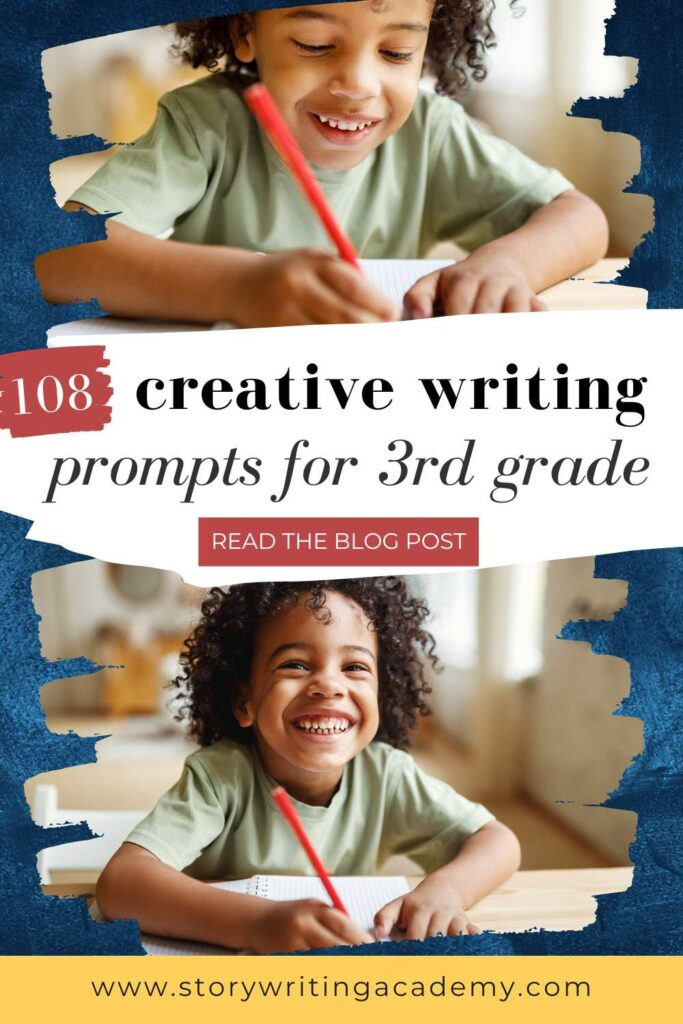
Story Starters and Other Narrative Writing Prompts
Writing stories—fictional or real—gives children a chance to develop several creative writing skills. They practice writing dialogue, developing characters, and fashioning situations that ignite their creativity and send them gallivanting down rabbit trails.
Although 3rd-grade students are still relatively new writers and most won’t produce complete narratives yet, practicing story writing is the best way to introduce concepts like plot, character, conflict, and setting.
Choose one of these concepts to focus on for several lessons and select third-grade writing prompts that lend themselves well to highlighting these aspects of writing. For example, you might ask students to spend a day or two focusing on their descriptions of the characters in their stories and another few days trying out different types of conflict.
Later, they might choose to take the parts they like best from these various assignments and put them together to form a larger narrative.
These story starters are fun writing prompts designed to push kids out of their comfort zones and put their imaginations to work.
Instructions for students
- These storytelling prompts are written in a few different styles. Some of them offer you the first line of a story. For these prompts, copy the first line onto your page and continue writing from there.
- Other prompts give you a specific situation and then ask you to think about what you might do or say in that situation. They could also ask you to take the idea as a starting point and expand it to make it more your own. Don’t feel like you need to answer the questions directly. They are there to give you more ideas to think about as you develop your story idea. You can write your story as answers to the questions if you like, but you can also just use them as inspiration.
- When you see an ellipsis (three dots) at the end of a writing prompt, that means the sentence is incomplete and your version of the sentence should replace the three dots with your own words.
24 Story Starters and Creative Writing Prompts for Third Graders
- Imagine you have the ability to become characters in video games. Write a short story that shows how you would use this power.
- Do you have a best friend? If so, write the story of how you met and became friends. (You can write what really happened or make up your own version of events to show how two people might become best friends).
- Write a story about a group of friends who build or discover a time machine. What time period do they travel to? Describe what they see, hear, smell, and eat.
- You and your friends are kayaking on a lake when you discover a hidden island. Describe what it looks like, how you explore it, and what you find there.
- It’s the hottest day of the year. You turn on your air conditioner and, instead of giving you an icy blast, it transports you to a snow-covered tundra. You see a small cottage with lights on and knock on the door. Who greets you and how do they help you get back home?
- Your doorbell rings. You answer the door, but there’s nobody there. Then you look down and see two lizards talking on cell phones. “We need to talk,” the smaller one says to you. What do they tell you? How do you respond?
- You just learned that your good friend has special powers she’s kept secret forever. All she needs is a cup of sand, three fish scales, and a splash of mud and she can make the most incredible thing happen. Write about what happens when she shows you her secret talent.
- There’s a big windstorm one night. The lights flicker and the power goes out. A few minutes later, it comes back on and your favorite character from the last book you read is sitting at your table. Who is it, what are they doing, and how do you make them feel welcome?
- Think about a fairy tale you know well, such as The Three Little Pigs or Little Red Riding Hood. Write your own version of the story with a few key details changed. For example, instead of The Three Little Pigs, you could write about The Three Shy Turtles or The Three Little Pigs and Their Big Sister.
- You go to watch a play at a theater, but when the curtains open, something unexpected happens. What is it and how do you respond?
- Write about a day in which time moves backward from night to morning.
- Write a story about two characters who don’t seem like they should be friends but somehow are. For example, you could write about a cat and a mouse, or an old woman and a little boy. What brought them together and in what ways does their friendship help them?
- You’re playing hide-and-seek with a friend and you hide in the attic. It takes her a while to find you and, while you are waiting, you start looking through some old boxes up there. You find letters written to a family member a long time ago. Who are they from? What do they say? Imagine you learn about a family secret while reading them. What could it be?
- Write a story that happens completely in one small space like a closet or a car. Include at least two characters.
- A young cat finds itself alone in the forest. How did it get there? What does it do? Who does it meet? Does it find its way home or stay there? Tell its story using lots of descriptive words.
- “It’s not all your fault,” my mom said. “There’s something you don’t know.”
- One day, everybody brings their favorite stuffie to class. A mix up happens and all the stuffies go home with the wrong kids to the wrong houses. What happens that night? Try to write from more than one perspective. For example, you could write a paragraph or two from the perspective of one of the students and then a paragraph or two from the point of view of a stuffie. You could also have a paragraph that quickly highlights the action at several houses. (“Kimmy’s little sister cried all night. Panda freaked out when he missed his dinner and tried to eat the toilet paper. Leah wanted to call the police but her mom wouldn’t give her the phone.”
- Your aunt shows up at your house with a box of glazed donuts and a canoe strapped to the roof of her car. “Time for a little trip,” she says.
- Write a story that’s told entirely in letters between two friends. They might write about the last time they saw each other, the upcoming summer break, or some of their favorite book characters. Tell us as much as you can about the characters and their friendship without writing about them. Let everything come out through the letters they send.
- What if you could invent a new planet? What sounds, sights, and smells would it have? Would people live there or some other kind of creatures? After you write down the details of your planet, write a short story that takes place there. You might write about how it was discovered or you could write a scene that shows what life is like there.
- You’re walking through the park with your family. You come around a curve in the path and spot a fox sitting under a tree writing in a notebook. What do you do? Do you talk to it? Does it speak? What is it writing?
- You’re sitting on the sofa watching a TV show when your sister, who is an artist, comes into the room. She has taken all your favorite toys and used them in her art project. Describe what you see, the conversation you have with her, and the lengths you’ll go to to recover your treasured toys.
- “It seemed like a good idea at the time,” said Alex. “If the owl hadn’t climbed the treehouse and eaten the fish…”
- The school year ended. You were supposed to be on holidays. Then your parents signed you up for summer school without telling you. It might have been okay if it weren’t for…
For another take on third-grade writing prompts, check out 70 Picture Prompts for Creative Writing .
Poetry Writing Prompts for Third-Grade Students
Another great way to introduce 3rd graders to creative writing is to get them writing free verse poetry. …
Students should be encouraged to brainstorm their own topics, as the ones they come up with will likely be the most inspiring for them. However, if they’re stuck for ideas or you want to give them a list of things to write about, have them pick one of the topics below. They may also find it helpful to use a brainstorming sheet to flesh out their ideas.
- Make a list of three things that happened to you this week. Choose one of them and draft a poem that tells what happened and how you felt about it.
- Write a poem about a special tradition from your favorite holiday.
- Write an ode that celebrates your favorite subject in school. For example, “The Joys of Math” or “Ode to Art Class.”
- Write a poem describing the best pet you can imagine.
- Write a poem from the perspective of an animal.
- Write a poem that tells about an imaginary being. Try to convey details about its size, appearance, feelings, problems, abilities, and lifestyle.
- Write a haiku about your favorite summer activity.
- Write a poem detailing the first time you tried your favorite food. If you don’t remember that experience, feel free to make it up. How do you imagine it would be tasting that amazing dish for the first time?
- Write about a poem that describes a time when you lost something important.
- Write a poem about your favorite place without naming the place. Use lots of details that help the reader see this place in their minds.
- Write a poem about a recent dream you had. Try not to mention that it was a dream.
- Choose one of the four seasons and write a poem describing what makes it special.
- Write a poem about something that’s really special to you but that seems ordinary to everyone else such as an old t-shirt or a craft you made out of recycled materials. Try to help your reader understand why it’s so important to you.
- Write a poem describing a day when everything goes wrong.
- Write a poem about your favorite person. Include details about why they’re so important to you. Consider giving your poem to them as a gift.
- Write a poem about a secret place (real or imagined) that only you know about.
- Write a poem about all the things you love to do outside.
- Write a poem that introduces your city or town to a visitor who has never been there.
- Write a poem about a game you love playing such as Hide and Seek, Pictionary, or Charades.
- Write a poem that includes dialogue. You could write the whole poem as a conversation or sprinkle dialogue throughout.
- Write a funny poem listing everything you think about when you can’t fall asleep at night.
- Write a poem that imagines something about your future. It could be a single event such as “When I Finally Go to Disneyland” or it could be a more general description of what you’d like your future life to be like such as “What I’ll Eat When I Grow Up.”
- Write a poem that explains how to do a simple task such as one of your favorite (or least favorite) household chores.
- Write a poem that uses as many sound words as possible such as bang, splash, chirp, and buzz.
For more poetic inspiration, check out 100 Inspiring Poetry Writing Prompts for Kids .
Journal Writing Prompts
Kids can also stretch their creative muscles through journal writing. Journaling is a precursor to memoir writing and storytelling is the heart of memoir. While journal entries can sometimes gravitate toward a mundane recitation of chronological events, they’re also an opportunity to challenge kids to become better writers.
A nice thing about journalling is that you don’t have to invent completely original material from scratch. You are taking events from your life and making an interesting story out of them, playing with language and sentence structure, and experimenting with what to include and exclude until you end up with something enjoyable to read.
Challenge kids to keep a running list of things that have happened to them in their writing journals so they always have a creative writing topic ready. Remind them that writing topics don’t have to be sensational (the birth of a new sibling, say). Simple events that might otherwise be overlooked—the sighting of the first blue jay to return in the spring, for example—can form the basis of strong pieces of writing when we take the time to reflect on the event and make connections.
Continuing with the blue jay example, such an experience might lead curious children to think about the changes that come with the season and, perhaps, the seasons of their own young lives thus far. Or they might ponder the bird and wonder what she’s been up to since she last visited the backyard. Maybe they’ll see two birds competing for a choice tree and reflect on an argument they had with a sibling. The more we can get them thinking about, reflecting on, and making connections between their experiences, the more we’ll see these themes emerge in their writing.
Here are some ideas to get them thinking about what to write in their journals:
- A trip you’ve taken
- Your feelings about a situation (losing an important toy, having to share a bedroom, or passing a swimming test, for example)
- How you spent a recent birthday or holiday
- A new skill you’ve just mastered
- A skill you wish you had but haven’t learned yet
- A food you tried but didn’t like
- A walk you’ve taken in nature
- A change in one of your friendships
- Something that scared you until you worked up the courage to try and then enjoyed doing
- A time when you really wanted something and finally got it
- A time when you really wanted something and didn’t get it
- A time when someone made you feel good
- Something you saw that turned out not to be what you expected it to be
- A time when you did something that scared you
- The way your favorite song makes you feel
- Something you’ve learned about recently that you wish you’d known sooner
- Describe your perfect day
- The toy or special thing you treasure the most and why it’s so special to you
- Your earliest memory
- A gift you received that meant a lot to you
- A time when you laughed until your belly hurt
- A teacher you’ve enjoyed learning from
- A book you’ve read over and over again
- Three things you love about your family
Need journal prompts for older kids? Check out these 60 Creative Journal Prompts for Teens
Songwriting Prompts
Writing songs is another fun way for kids to practice their creative thinking skills while also processing their emotions and experiences. Coming up with the lyrics to a song can provide stress relief for kids and give them an opportunity to express their emotions safely.
For some kids, coming up with lyrics and a melody to a song may be too challenging. Encourage them to choose a song, jingle, or nursery rhyme they already know and write new lyrics to the same tune. Examples of simple songs they might start with include: Twinkle Twinkle Little Star, Baa-Baa Black Sheep, London Bridge is Falling Down, Rock-A-Bye Baby, and Waltzing Matilda. You can find more kid-friendly songs in this playlist for kids .
As an extra challenge, kids may want to initially write their lyrics to fit an existing tune and then come up with a new tune once they have their lyrics down. This would be a good extension activity for kids who finish their lyric writing early.
- Write a song about your favorite animal.
- Think about three or four possessions (things you own) that are important to you. Write a song that celebrates the special role these items play in your life.
- Think about the last time you got angry. What made you angry? How did you feel? What did you want to do about it? What did you actually do? Write a song that helps someone else understand how you felt and why.
- What is your favorite show or movie? Choose a main character from that story and write a song inspired by them. It could be about them or it might be from their point of view. Think about what’s important to them and what they might want people to know.
- Write a song that describes your dream day. What would you do if you could do anything you wanted? Who would be with you? Make the details as specific as possible.
- Think about someone in your family who has an annoying habit. For example, your little brother who tells your parents everything you do wrong. Write a song that reimagines that annoying habit as a good thing. (“He must love me to pay so much attention to me…”)
- Write a song that is meant to be sung by a whole class of students.
- Write a song about someone you look up to.
- Write a song about something that most people seem to like but that you hate. Try to convince them they’re wrong about the thing and that it’s truly awful.
- Write a song about someone you don’t see anymore such as an old neighbor or a friend who moved away. What do you miss about the times you had with that person?
- Think about something you loved doing when you were younger but haven’t done in a while. Write a song that shares your memories of that activity.
- Write a song about something you hope for or would like to see happen.
Descriptive Writing Prompts
Descriptive writing adds color and texture to many forms of writing including travel writing, poetry, fiction, and memoirs. One of our challenges as teachers is ensuring kids know how to write effective descriptions while also helping them learn how to balance descriptive prose with other written elements such as dialogue and action. A written work too heavy in descriptive writing might help the reader create vivid pictures in their minds without ever telling them anything.
In third grade, these young writers are generally too young to discern this delicate balance between showing and telling, but it’s still a great time to develop their use of descriptive words.
Before giving them these writing prompts, introduce them to the importance of using specific nouns and vivid verbs and adjectives in their writing. This is a wonderful time to instill thesaurus skills and show them how to choose the most appropriate words for each situation.
When assigning prompts from this section, tell students their goal is to paint a picture with their words. If they read their work to a classmate who closes their eyes, can the classmate picture the scene clearly? If not, where do they need to add or change details?
- Write about the most memorable dream you’ve ever had. Describe it in as much detail as possible. Where did it take place? What did you see, hear, and smell? Who was there? What did they look like? What did they do?
- Choose a room in your house and describe its most important features.
- Go outside and find a tree, flower, or other plant that intrigues you. Describe it in detail: what does it look like? How big is it? What does it feel like? If one of your friends took your description and went to the same outdoor area, could they find your plant based on your description?
- If you could decorate your bedroom any way you wanted with no limits, what would it look like?
- Imagine the coziest outfit you can. Describe how it looks and feels. How do you feel when you put it on?
- Describe your mom or another woman you know well. What does she look like? What does her voice sound like? Does she have wear a certain perfume? How do you feel when she gives you a hug or puts her arm around you?
- Describe a regular tradition you have with your family, such as having a large pancake breakfast on Saturdays. Help your reader feel like they’re living the memory with you by painting a detailed picture of the scene.
- Write about the inside of your family’s car. What does it smell like? How many seats are there? What would you find if you looked between or underneath the seats? Describe the music you listen to in the car and the kinds of conversations you have there.
- Describe a store you go to frequently. If possible, try to visit the store before you write about it and make notes about the things you notice there using your five senses. Tell about what you see, hear, taste, smell, and feel.
- Describe your writing process, that is, what you do when you write. Do you sharpen pencils and put an eraser nearby? Do you start writing right away or do you make an outline or brainstorm ideas first? Do you write single-spaced or double-spaced? Is your writing neat or messy? How do you feel when you write?
- What is the best thing about being you? Maybe it’s your sense of humor, your Lego-building skills, or the way you ride your bike fearlessly down hills. Maybe you live in a really cool city with lots of fun things to do. Whatever makes your life special, write about that and describe why you love it.
- What’s your favorite thing to do on a Sunday morning? Describe what you do, who does it with you, and how you do it.
Other Creative Writing Prompts for 3rd-Grade Students
- Write a scene where a famous person from another time period shows up in your classroom.
- Write a diary entry from the perspective of a Disney character or a character from a book you’ve read.
- Think about a scene you didn’t love in your favorite movie. Rewrite the scene to make it more enjoyable.
- Write a letter to your favorite author and tell them what you love about their book(s).
- Invent a new country with its own language, customs, and history. Write about how your country came to be and what makes it special. If you want, you can draw a map to go with your writing.
- Write a scene from the point of view of an object in your house such as a toaster, the dining table, or a video game console.
- Write a story or poem in which each sentence starts with the next letter in the alphabet. In other words, the first sentence or line starts with A, the second with B, the third with C, and so on.
- Write about a lost object that was found after many years.
- Pick a city you’ve visited and make a travel brochure about it. Include a section in which you describe the city and another in which you talk about your experience there.
- Write a comic book* based on your favorite book or story. Try to include both dialogue (in speech bubbles) and descriptions of what’s happening.
- On a big piece of paper, draw a picture of the inside of a really cool house with loads of interesting rooms. Then write a short story about the people who live there and what life is like inside their amazing house.
- Write an imaginary interview with a character from a book or movie. Pretend you’re asking them questions to publish in a magazine or newspaper and invent their answers.
Comic book templates are available in our post, 10 Fun Writing Activities for Kids .
Privacy Overview
- Grades 6-12
- School Leaders
Don't Miss the Grand Prize: A $2,500 Office Depot/OfficeMax Card!
50 Creative 3rd Grade Writing Prompts (Free Printable!)
Taking the leap from the primary level to the intermediate grades.
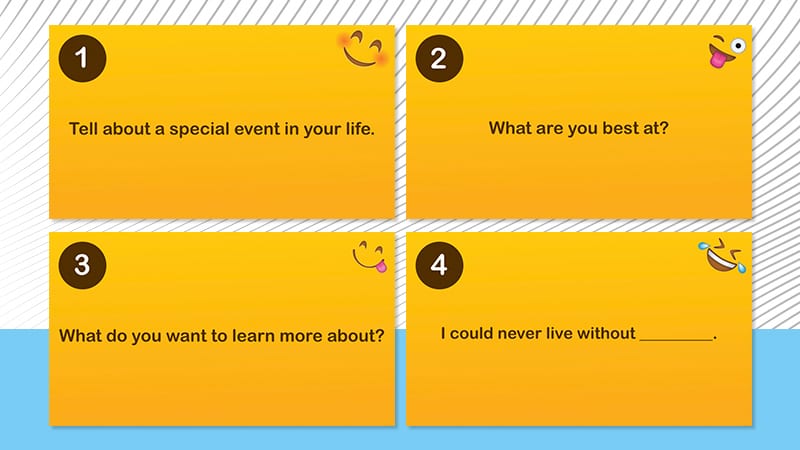
Third grade is a huge transitional year in elementary school. Third grade writers have learned foundational concepts and skills and have had time to practice. Now they are developing more complex skills as they dig deeper, learn to make connections, and analyze the topics they write about. Here are 50 third grade writing prompts to help your students master and refine their writing skills.
If you’d like even more upper elementary writing prompts, we publish new ones twice a week on our kid-friendly site: the Daily Classroom Hub . Make sure to bookmark the link!
(Want this entire set in one easy document? Get your free PowerPoint bundle by submitting your email here, so you’ll always have the prompts available!)
1. Tell about a special event in your life.
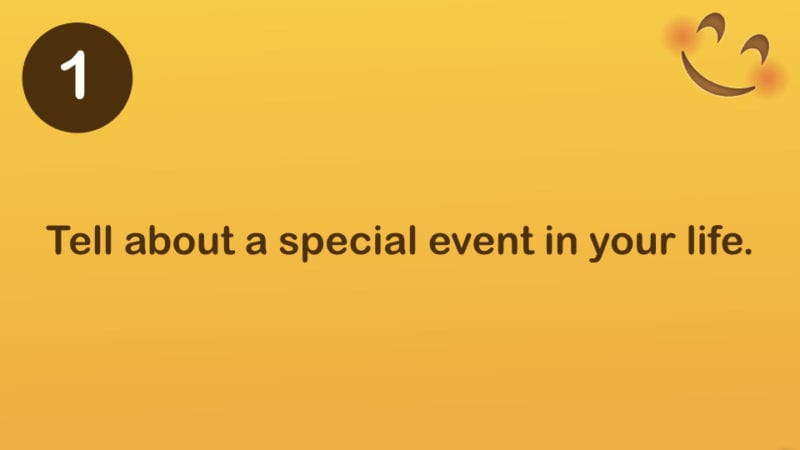
2. What are you best at?
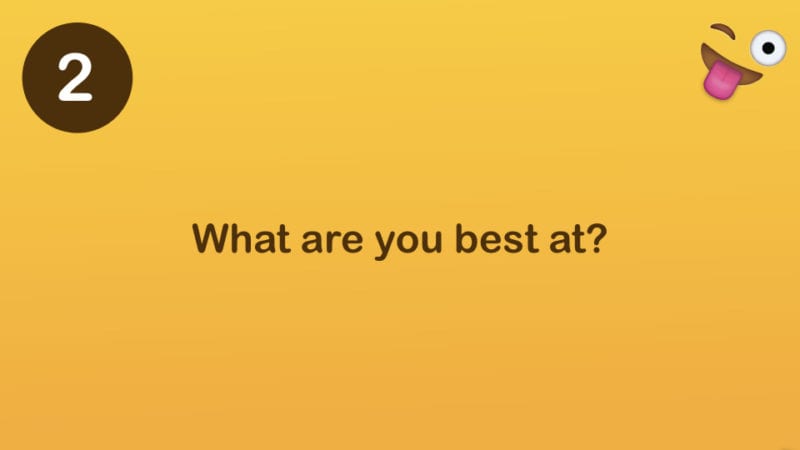
3. What do you want to learn more about?
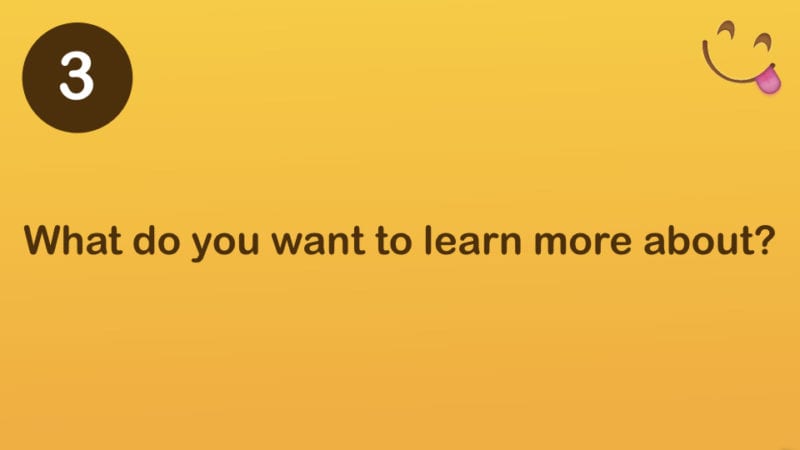
4. I could never live without______.
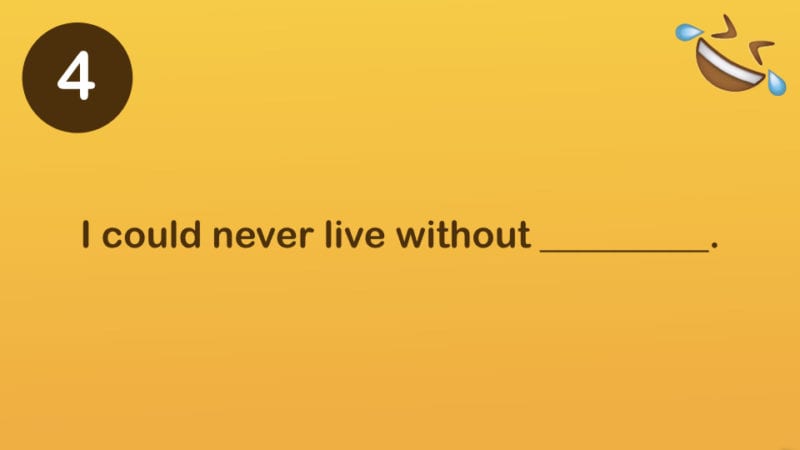
5. If you could go anyplace in the world, where would you go and why?
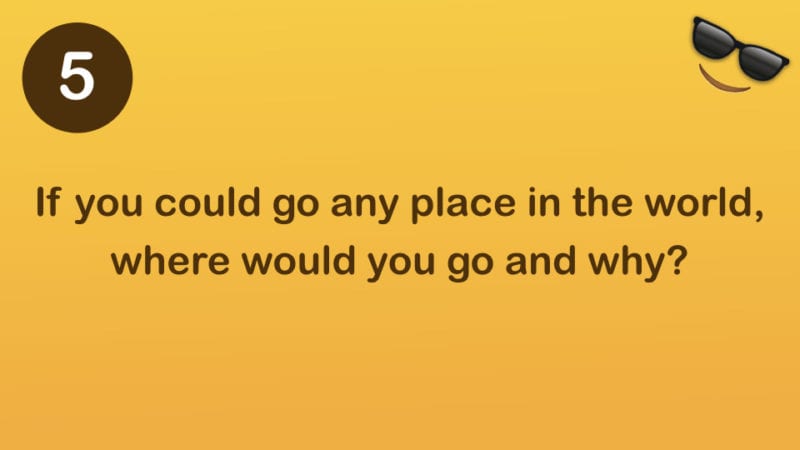
6. Interview one of your parents or grandparents and ask them to tell you a story from their childhood. Share their story here.
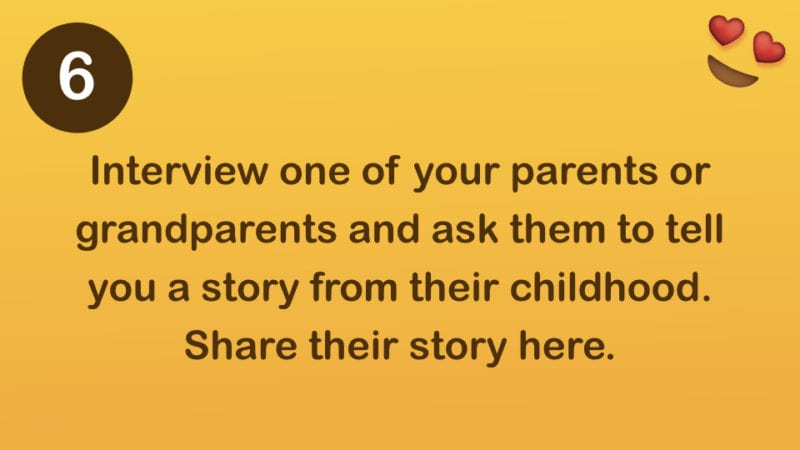
7. Describe one of your favorite book characters. Tell three things about their personality.
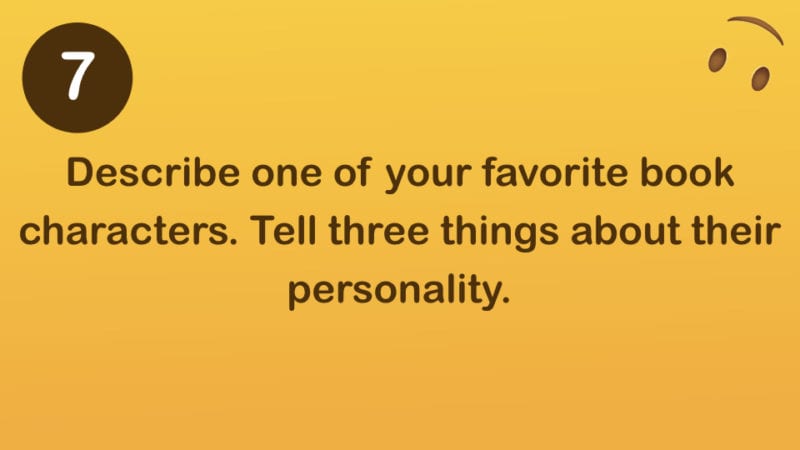
8. Do you think third graders should have to do chores at home? Why or why not?
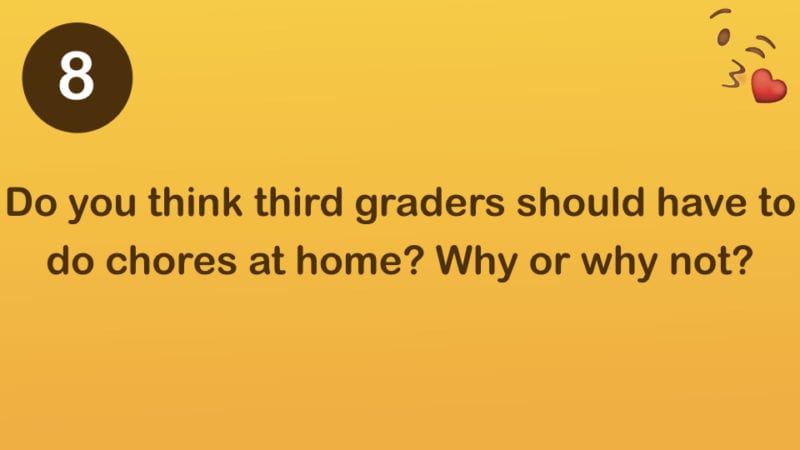
9. What is something you would change about school if you could?
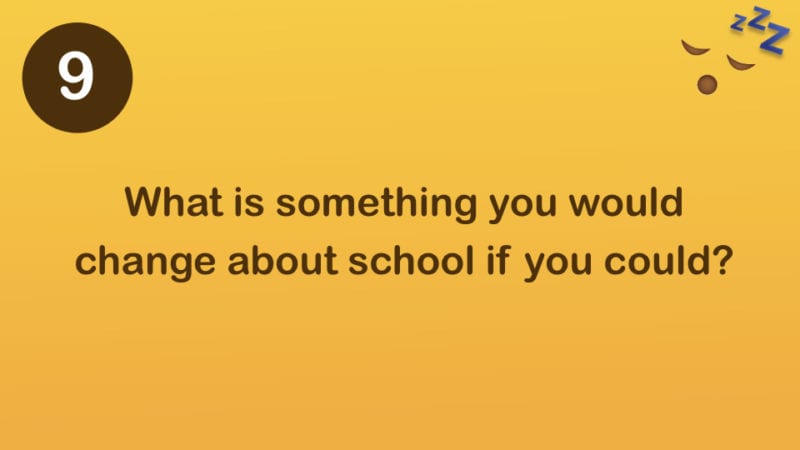
10. Tell about a time you helped somebody.
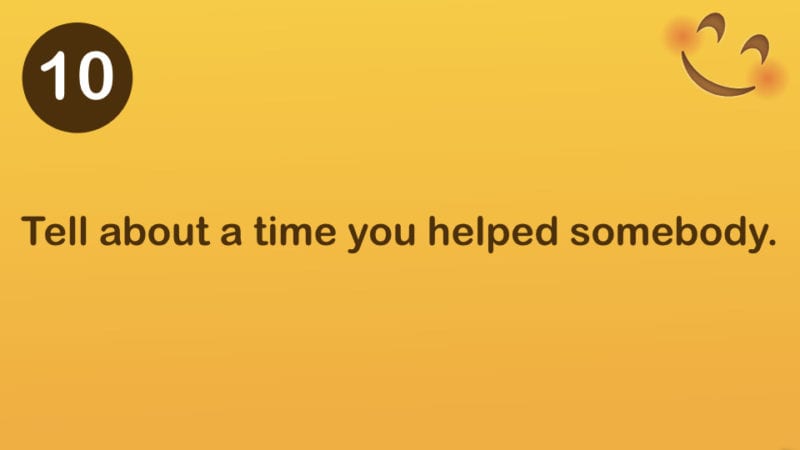
11. Tell about a time somebody helped you.
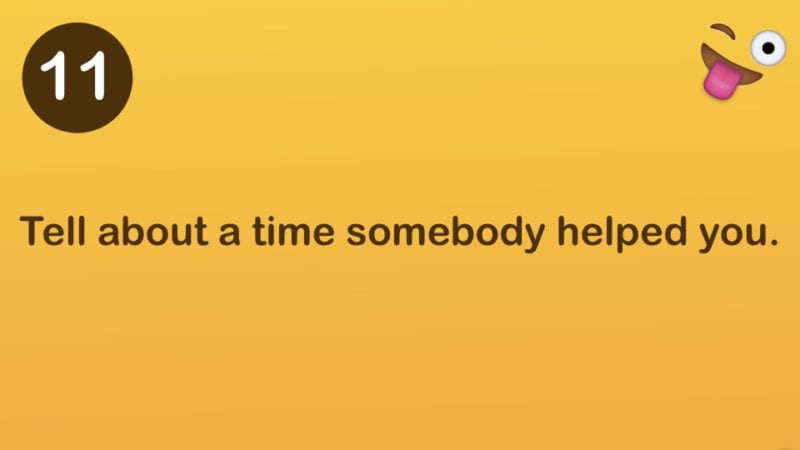
12. Tell about a memorable “first” in your life. For example, the first time you ate a particular kind of food, the first time you met your teacher, etc.
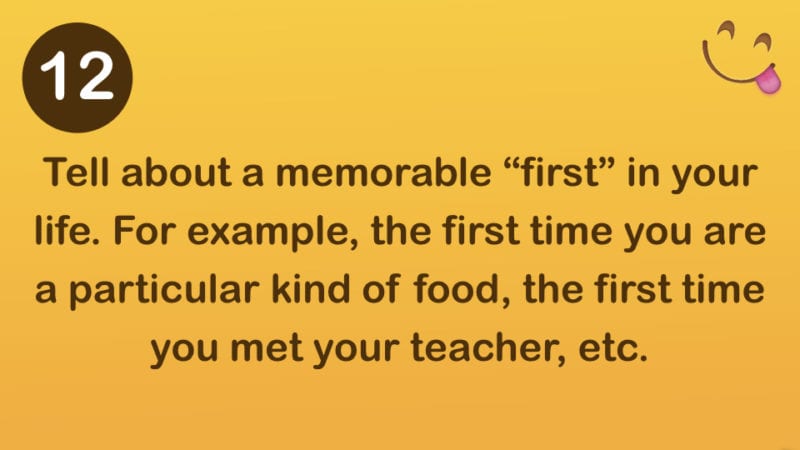
13. Describe step by step how to make a pizza.
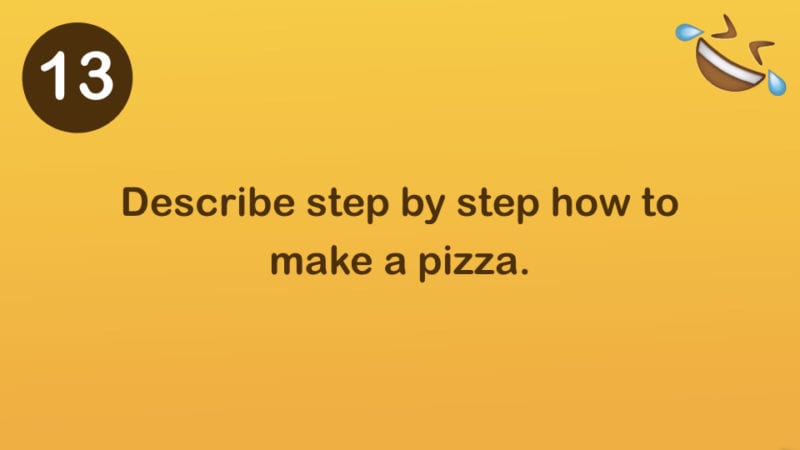
14. What does it mean to be a hero?
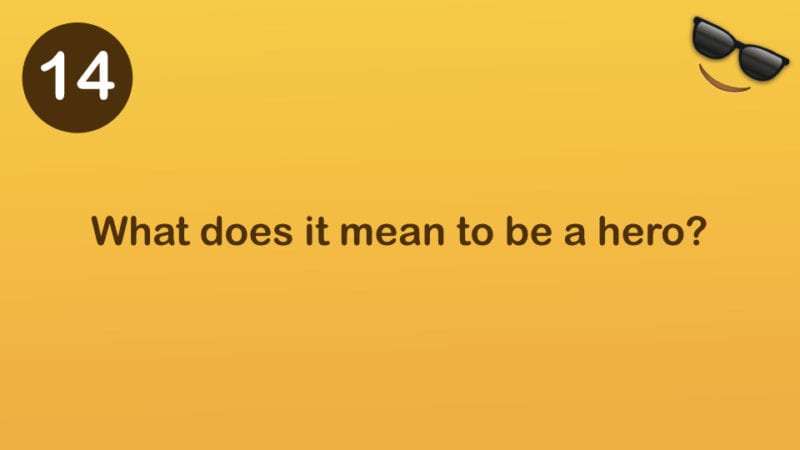
15. I am afraid of _______ because_______.
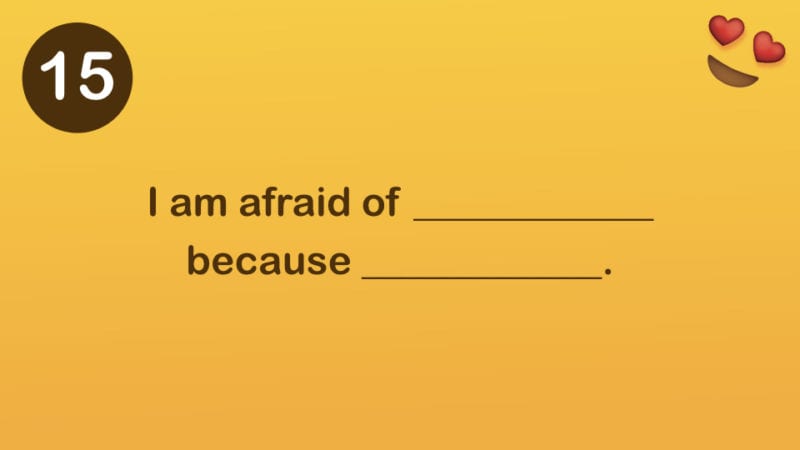
16. What is the difference between being polite and rude? Give three examples.
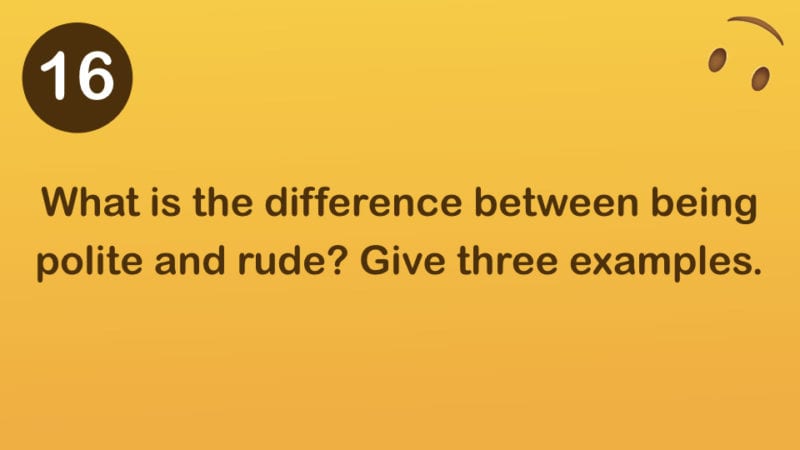
17. What is the most important rule in the classroom?
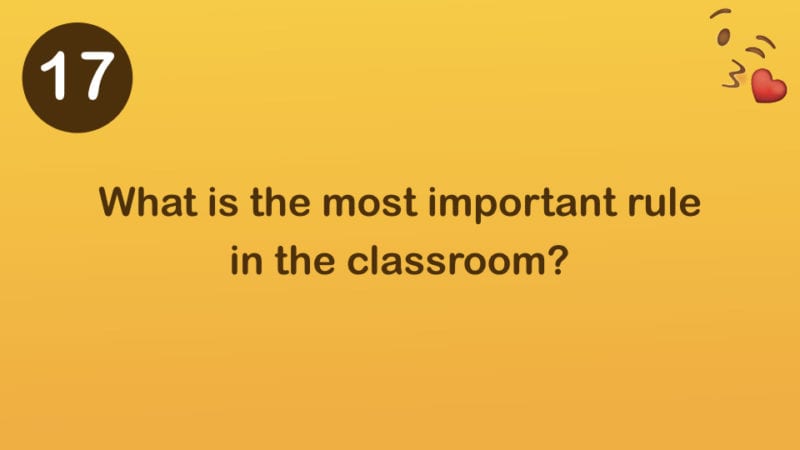
18. What are the three most important qualities you look for in a friend?
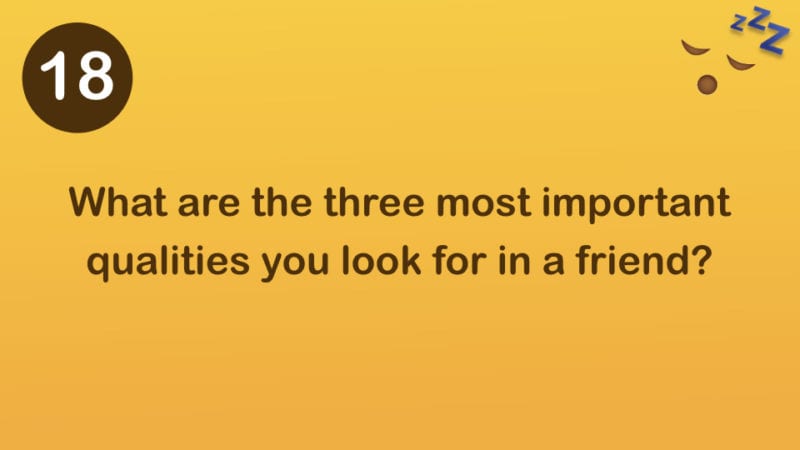
19. Do you think kids should be assigned homework? Why or why not?
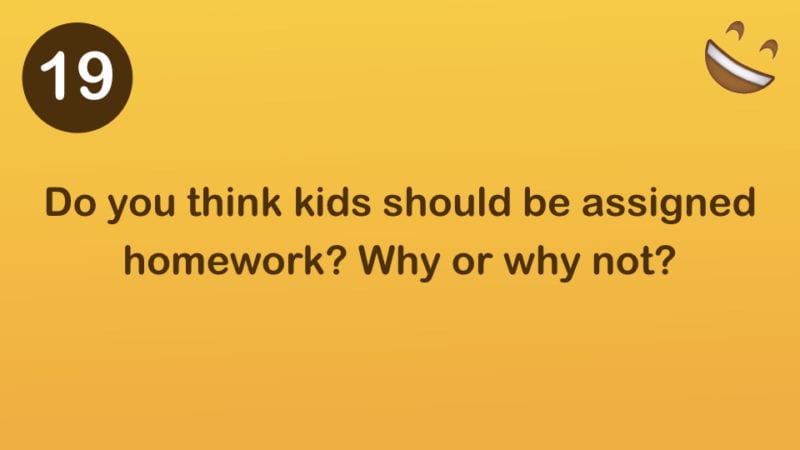
20. Nature gives us many beautiful things—plants, animals, water, weather, stars and planets, etc. What is one of your favorite things in nature and why?
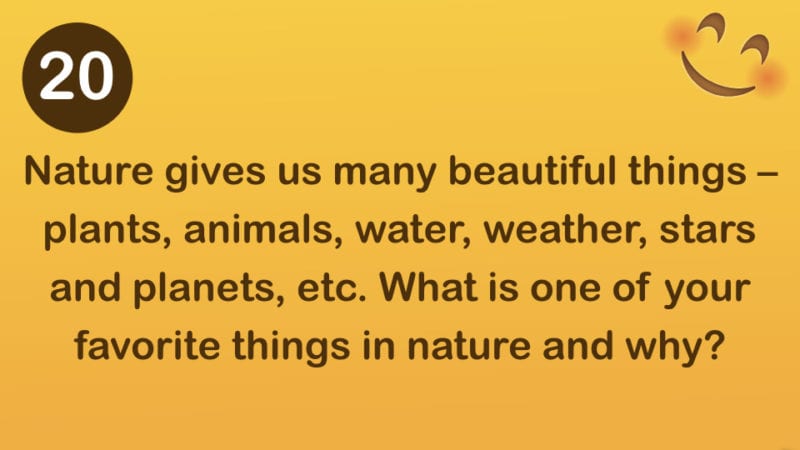
21. If I were a spider, I’d _______.
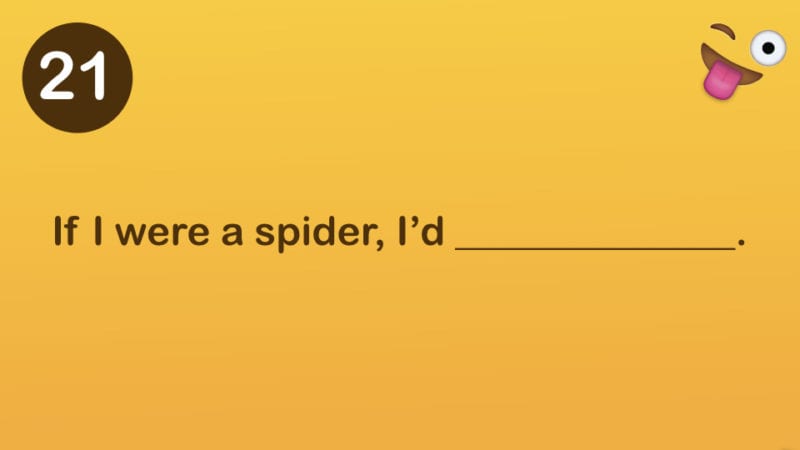
22. Three things that make me happy are ______.
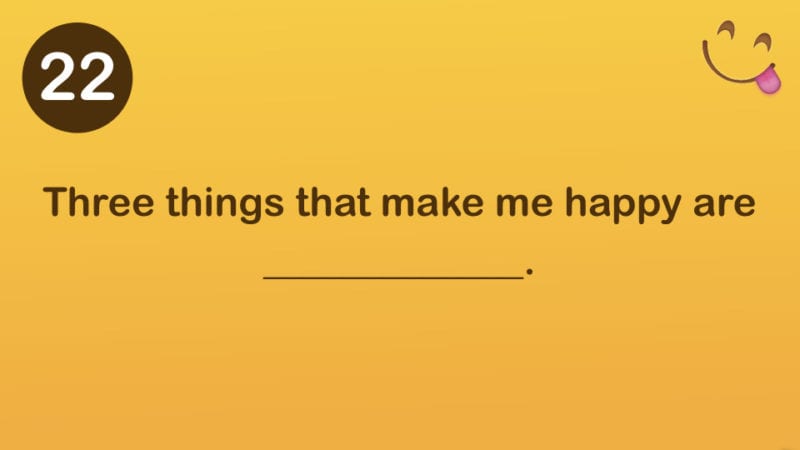
23. What is your favorite holiday and why?
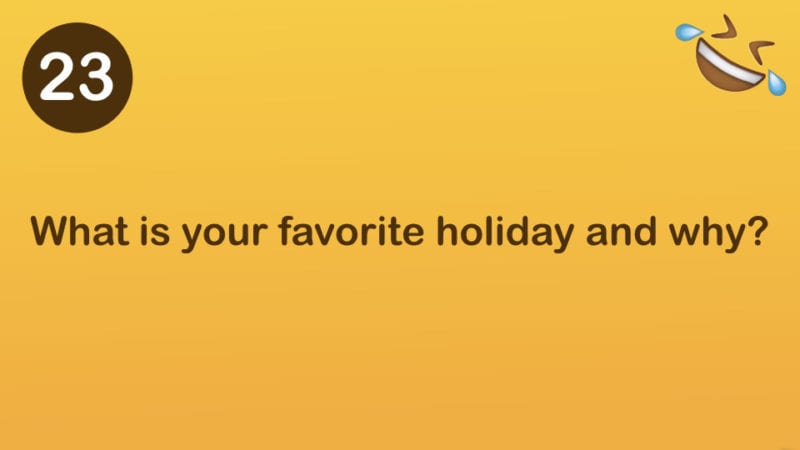
24. Tell about one of your family’s unique traditions.

25. If you could have a pet, what would you choose? How would you take care of it?
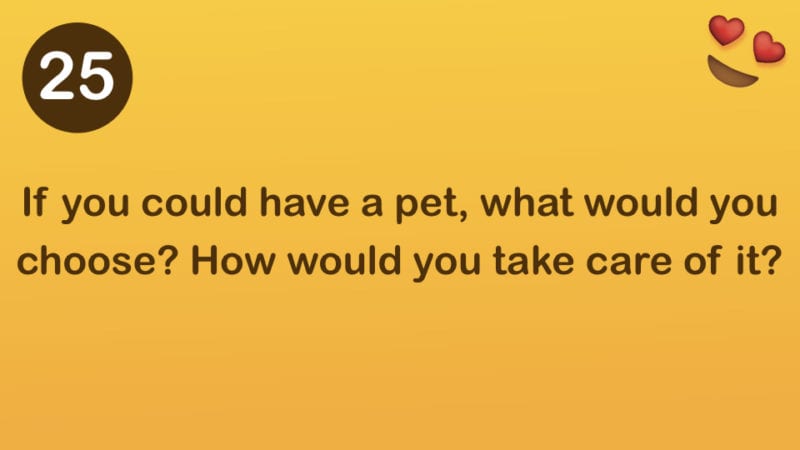
26. Write about a dream you recently had.
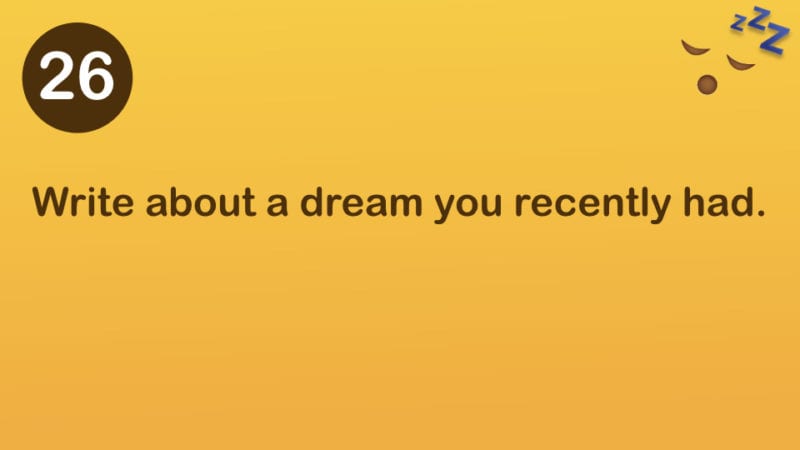
27. Tell about a person that inspires you and why.
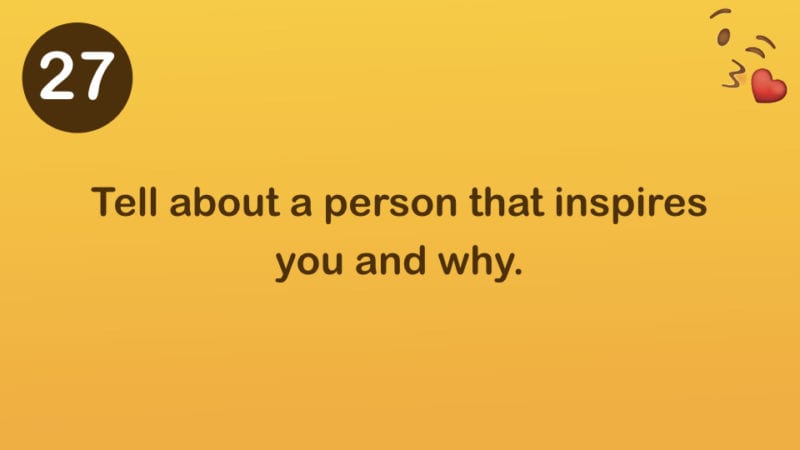
28. Name five things you are thankful for and why you are thankful for them.
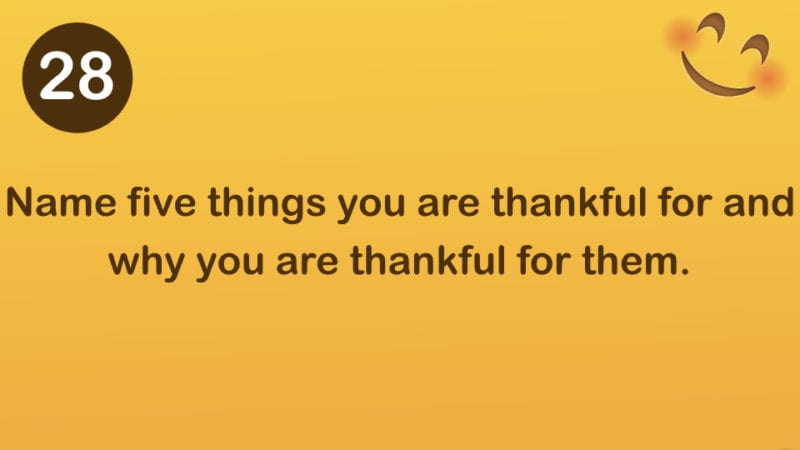
29. What are ways you can be a good citizen?
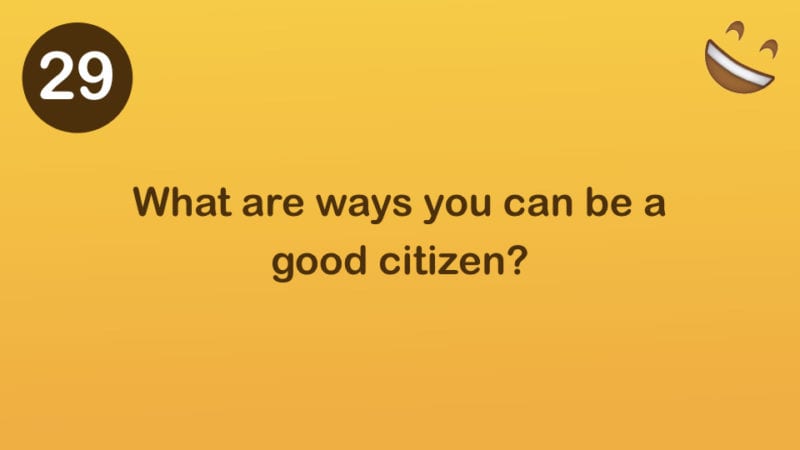
30. When you and a friend disagree, how do you work it out?
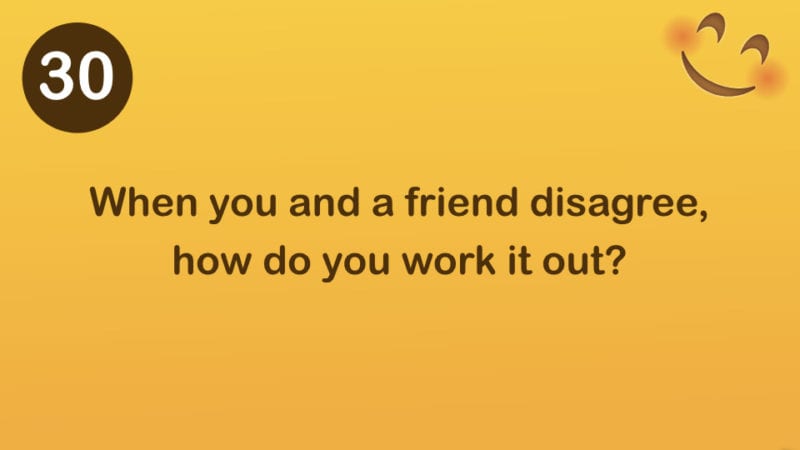
31. What do you think the world will be like in one hundred years?
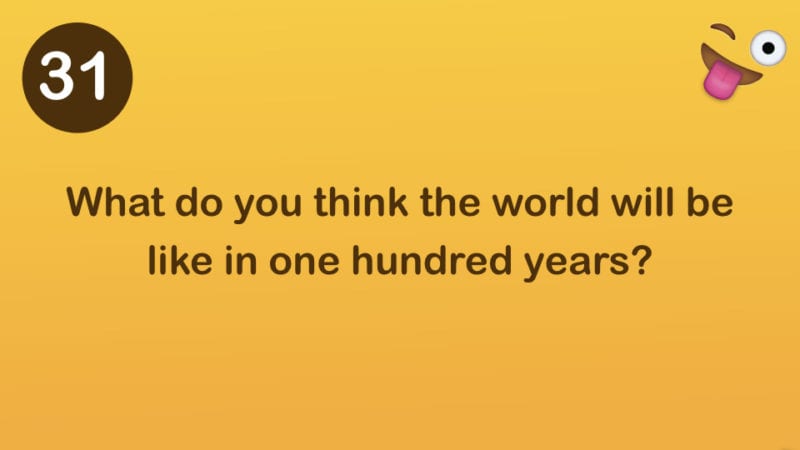
32. What is your favorite type of weather? Why?
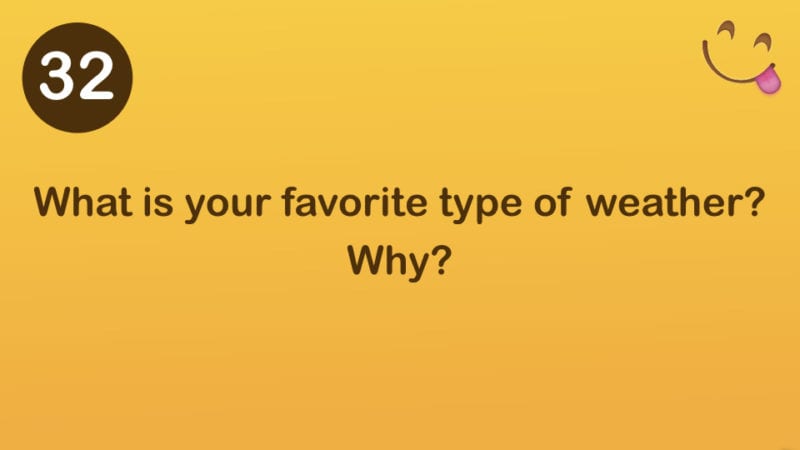
33. What superpower do you wish you had? Why?
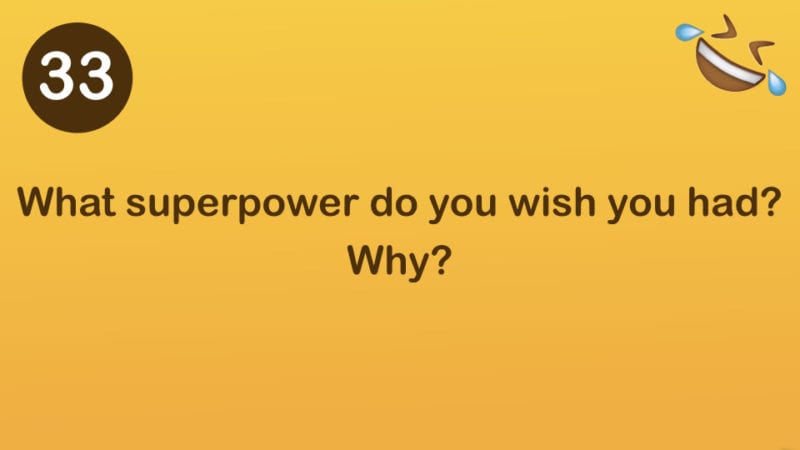
34. What famous person would you like to meet? Why?
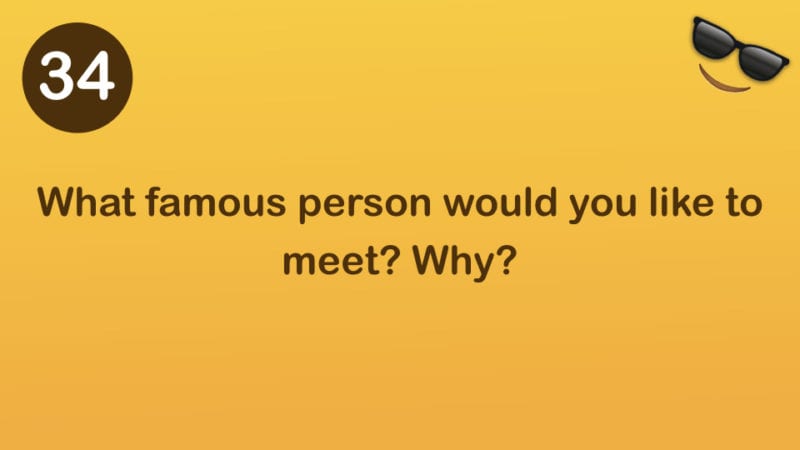
35. In your opinion, which animal makes the best pet? Give three reasons for your answer.
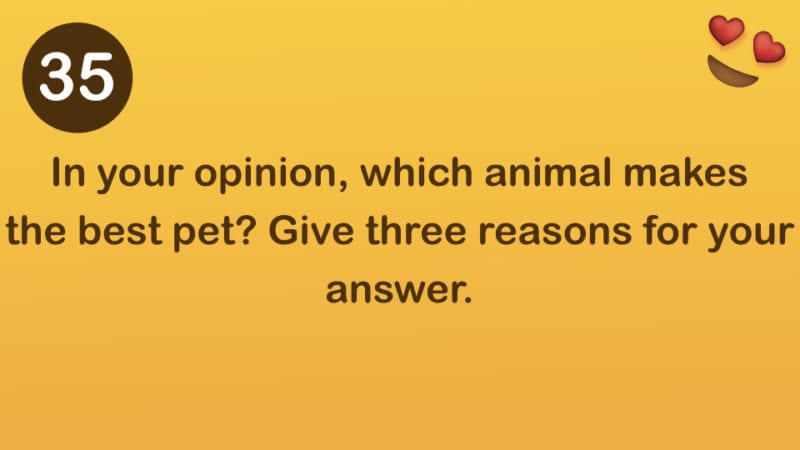
36. If someone gave you $100, how would you spend it?
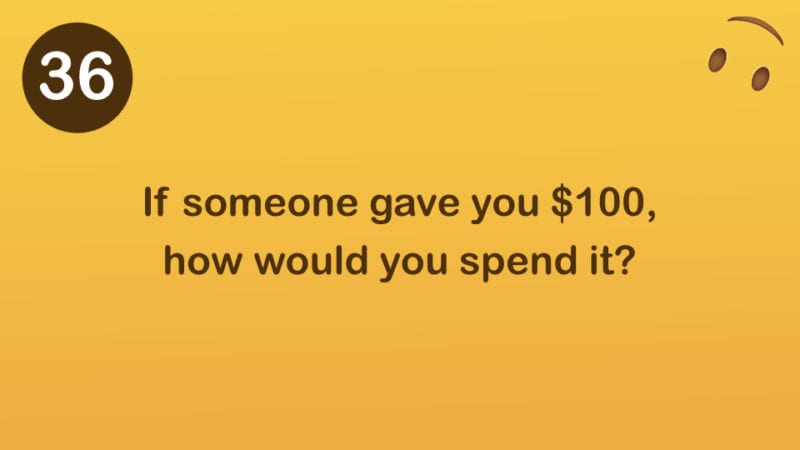
37. Should third graders have cell phones? Why or why not?
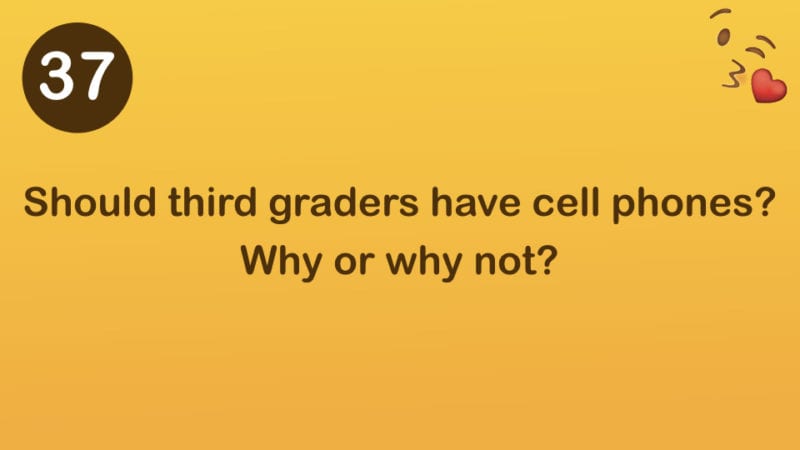
38. If you could be an Olympic athlete, what sport would you participate in?
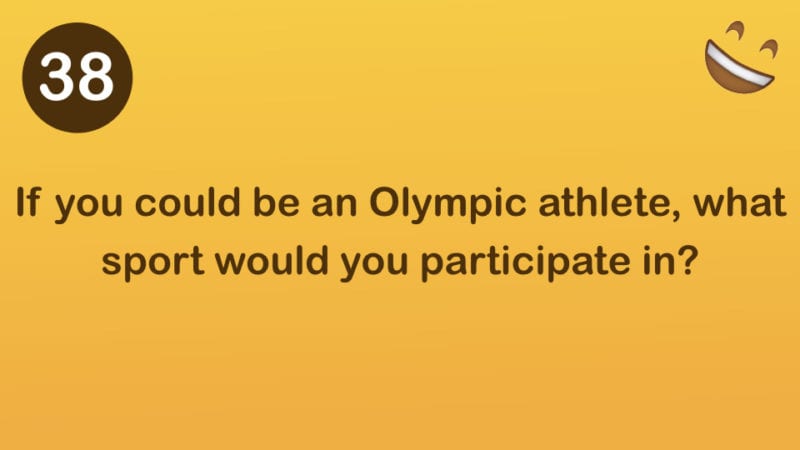
39. Write about your “getting ready for school” routine.
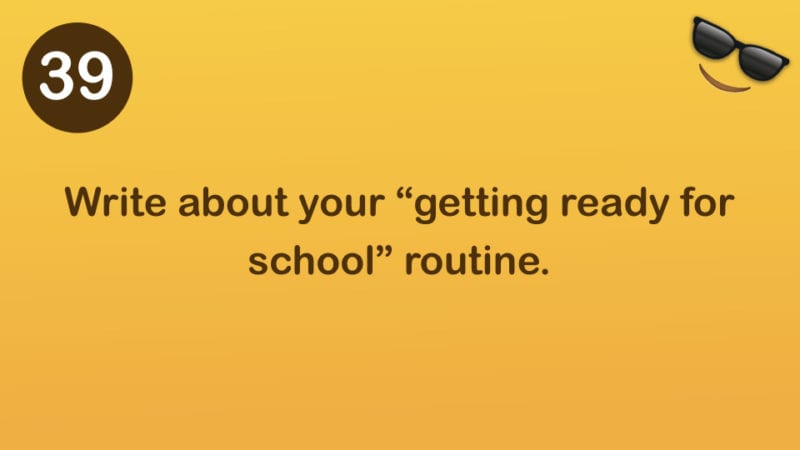
40. Write about your “getting ready for bed” routine.
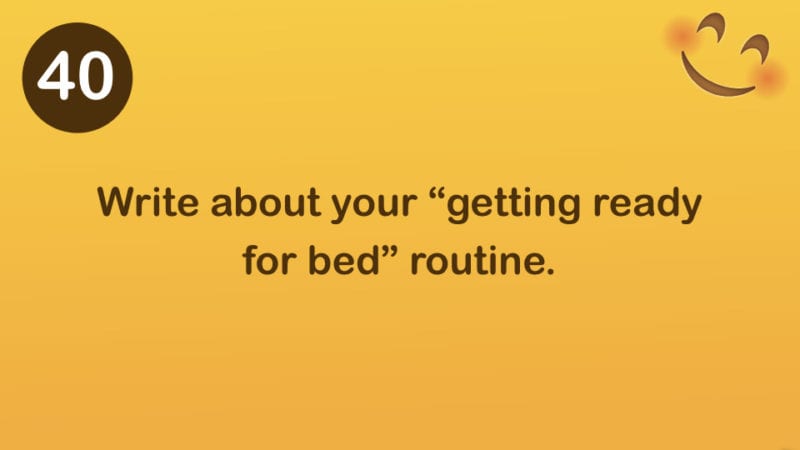
41. If you could travel through time like Jack and Annie in the Magic Tree House, where would you go?
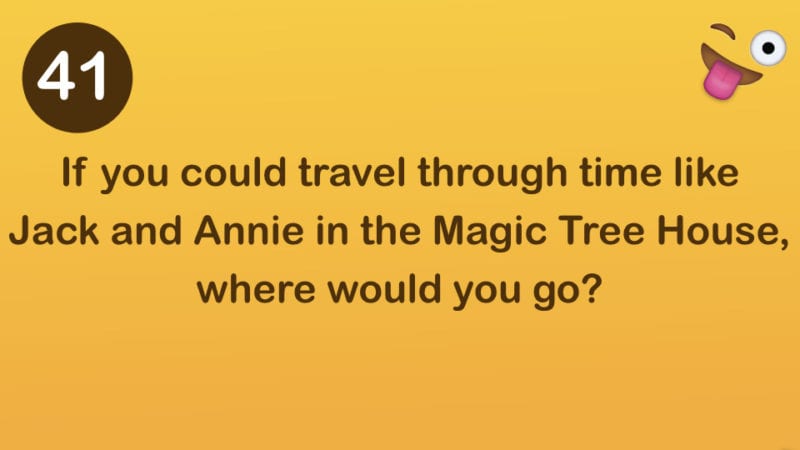
42. In your opinion, what does a perfect weekend look like?
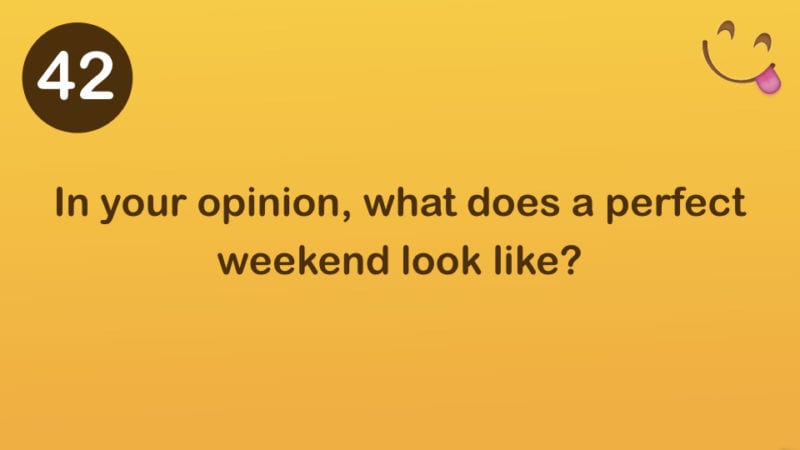
43. Write about the last time you felt really angry. What happened and how did it all work out?
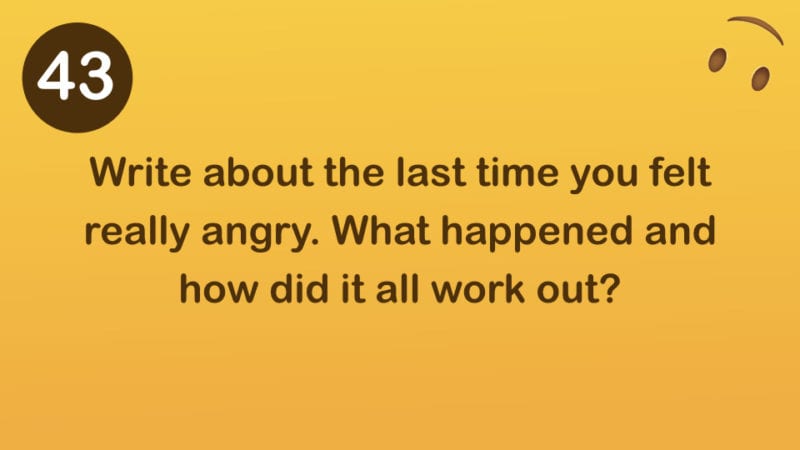
44. Pretend there was a special zoo where animals could talk. Which animal would you talk to and what are three questions you would ask?
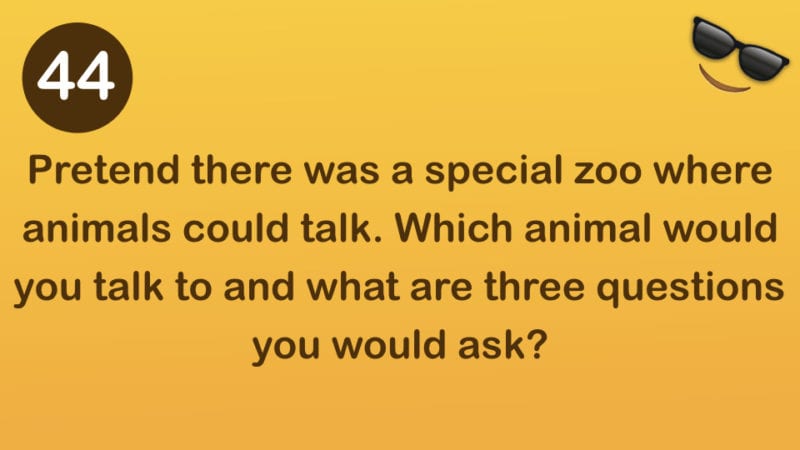
45. What is your favorite thing with wheels? Why?
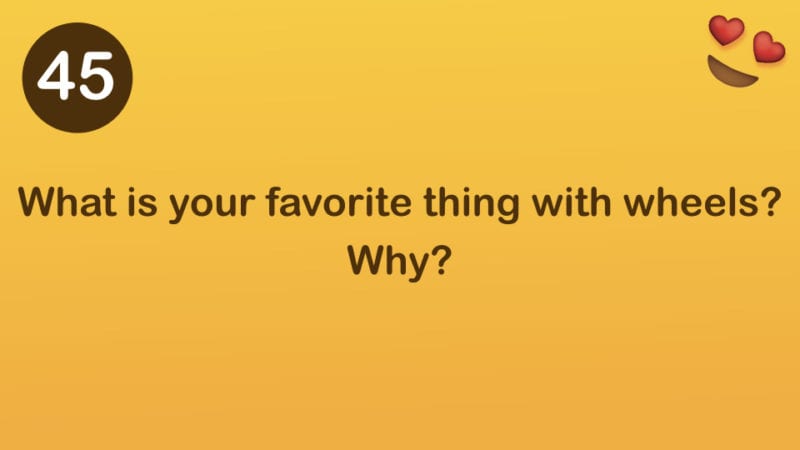
46. Tell the story of Goldilocks and the Three Bears from the point of view of Baby Bear.
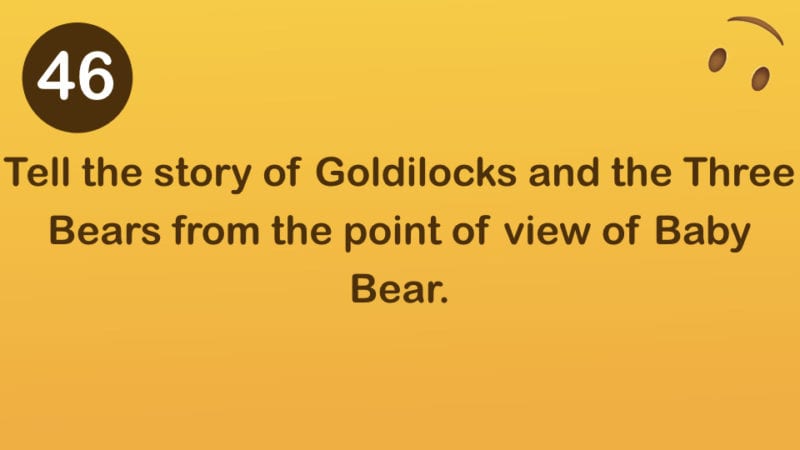
47. What do you think would grow if you planted a magic bean?
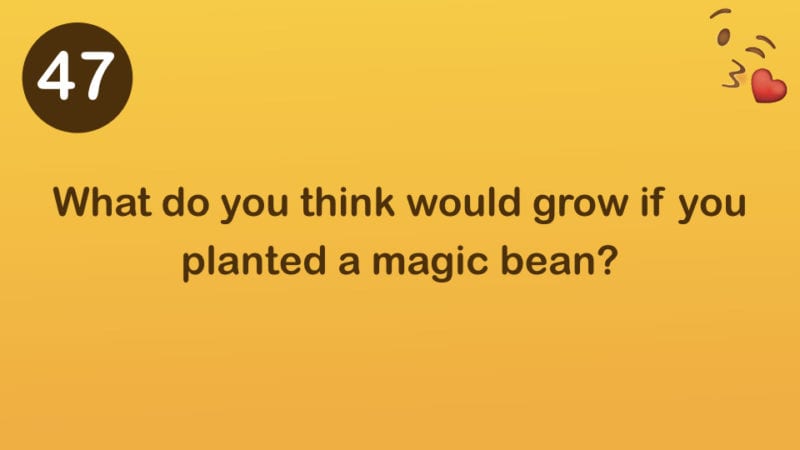
48. Which would you rather be able to do—fly or read people’s minds? Why?
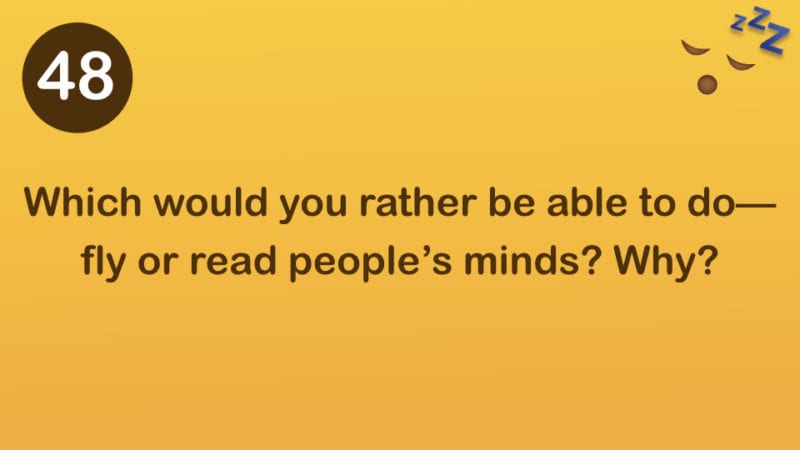
49. Tell about an adult in your life that you admire.
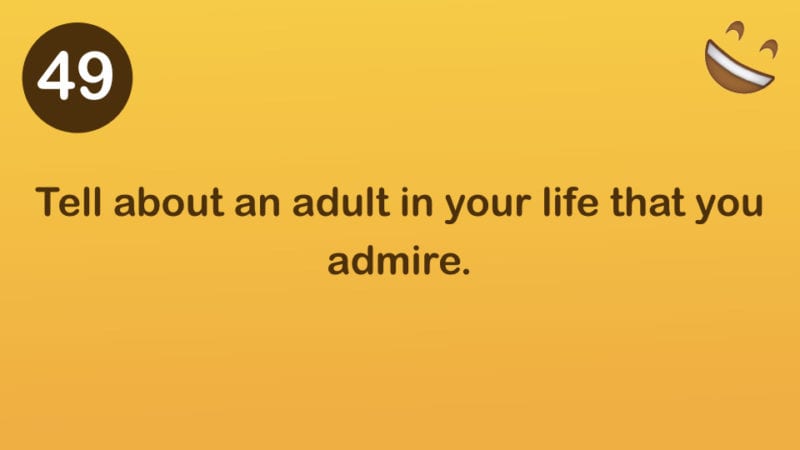
50. If you were traveling for a week and could only bring a backpack, what would you pack?
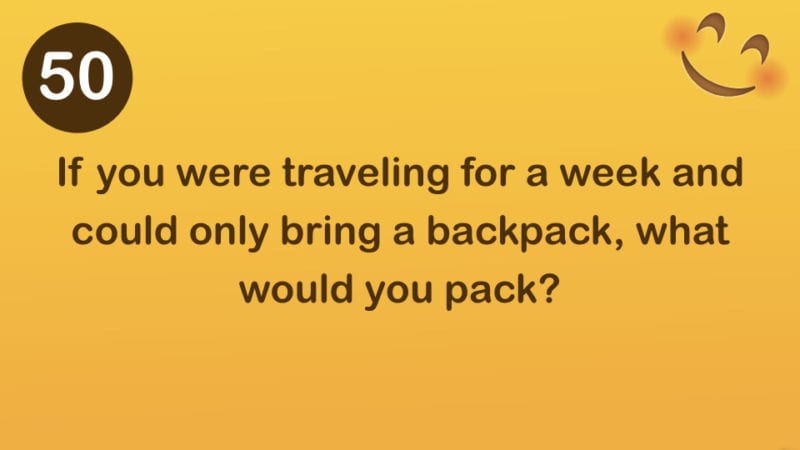
Get My Third Grade Writing Prompts
Love these third grade writing prompts? Make sure to check out our third grade jokes to start the day !
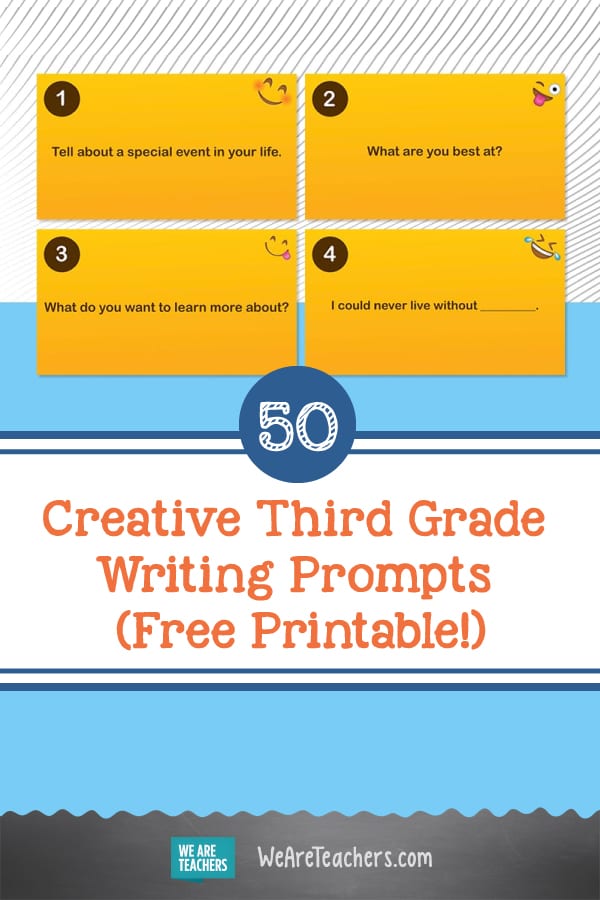
You Might Also Like

101 Exciting 4th Grade Writing Prompts for 2023 (Free Printable!)
Use them for journal writing, essay topics, and more! Continue Reading
Copyright © 2024. All rights reserved. 5335 Gate Parkway, Jacksonville, FL 32256
Third Grade Creative Writing Worksheets

- The Parts of a Letter
- Write Your Own Mad Libs ®
- Writing a Descriptive Paragraph (Gr. 3)
- Fill-in Story: The Halloween Party
- Fill-in Halloween Story: A Scary Night
- Fill-in Story: Halloween Carnival
- Writing a Personal Narrative (Gr. 3)
- My Friend Writing Printable
- Student Proofreading Checklist
- Creative Writing with Photo Inspiration
- Same Name Word Puzzle
- Life in the Sea
- Bio Poem Handout
- Writing a Research Report (Gr. 3)
- Favorite Foods
- Script Writing Handout
- Make Your Own Holiday
- A Note About Witches: Fill-in-the-Blanks
- Antonyms and Synonyms
- Immigration Picture Prompts
- Post Card Template
- My New Year's Resolutions (3-6)
- Discovering Pronouns 10
- Discovering Punctuation 2
- Discovering Capitalization 4
- Discovering Punctuation 9
- If I Were the Teacher
- Writing Activity: Describe the Rain Scene
- Change the Dialog in a Comic Strip
- Discovering Conjunctions
- More Creative Writing Printables, 3rd Grade
Featured 3th Grade Resources
Related Resources

About the author

TeacherVision Editorial Staff
The TeacherVision editorial team is comprised of teachers, experts, and content professionals dedicated to bringing you the most accurate and relevant information in the teaching space.

Creative Writing For Class 3 Format, Examples, Topics, Exercises
Creative writing for Class 3 is a great way to encourage young children to develop their imagination, improve their language skills, and foster a love of writing. In this guide, we will explore the format of creative writing for Class 3, provide examples of different types of creative writing, suggest topics for writing exercises, and give tips for teachers and parents on how to inspire and support young writers.
Also Read: Creative Writing Topics For Class 4

Format of Creative Writing for Class 3
Creative writing for Class 3 should be structured in a way that is easy for young children to understand and follow. The basic format should include:
1. Introduction: The introduction should provide a brief overview of the topic and set the scene for the story. 2. Body: The body of the story should include the main events or ideas. This is where the plot unfolds and the characters develop. 3. Conclusion: The conclusion should wrap up the story and provide a sense of closure for the reader.
Examples of Creative Writing for Class 3
There are many different types of creative writing that Class 3 students can explore. Here are some examples:
1. Narrative Writing: Narrative writing is a story told from a particular point of view. It can be fiction or non-fiction and can be told in the first, second, or third person. Here is an example of a narrative:
Once upon a time, there was a little girl named Alice. She lived in a small house on the edge of the forest with her parents and her cat, Mittens. One day, Alice decided to explore the forest. She wandered deeper and deeper into the woods until she came across a clearing. In the center of the clearing was a small pond. As she approached the pond, she heard a strange noise. It sounded like soft, melodic singing. She looked around, but she couldn’t see anyone. Then, she saw a tiny, golden fish swimming in the pond. The fish was singing! Alice couldn’t believe her ears.
2. Descriptive Writing: Descriptive writing is when the author uses vivid language and sensory details to create a picture in the reader’s mind. Here is an example of descriptive writing:
The sun was setting over the ocean, casting a golden glow over the water. The waves were calm, lapping gently against the shore. A flock of seagulls soared overhead, their wings outstretched against the orange and pink sky. The salty breeze carried the smell of seaweed and sand. The beach was almost empty, except for a lone figure walking along the shoreline, lost in thought.
3. Persuasive Writing: Persuasive writing is when the author tries to convince the reader to agree with their point of view. Here is an example of persuasive writing:
Everyone should recycle. Recycling helps to reduce waste and conserve natural resources. By recycling, we can save energy, reduce pollution, and protect the environment. Recycling is easy and can be done by everyone. So, let’s all do our part and recycle!
Topics for Writing Exercises
Here are some topics that Class 3 students can use for writing exercises:
1. Write a story about a magical adventure. 2. Describe your favorite place in the world. 3. Write a persuasive essay about why kids should be allowed to have more free time. 4. Imagine that you are an animal. Write a story about a day in your life. 5. Describe a time when you felt really proud of yourself.
Tips for Teachers and Parents
Here are some tips for teachers and parents to help inspire and support young writers:
1. Encourage creativity: Encourage children to use their imagination and think outside the box. Let them explore different writing styles and genres.
2. Provide feedback: Give children constructive feedback on their writing. Point out what they did well and suggest areas for improvement.
3. Create a positive environment: Create a positive and supportive environment for writing. Celebrate each child’s successes and encourage them to keep writing.
4. Read and discuss: Read books together and discuss them with your child. Talk about the characters, the plot, and the writing style. This can help inspire children to create their own stories.
5. Use prompts: Use prompts to help children get started with their writing. Prompts can be as simple as asking them to write about their favorite animal or as complex as asking them to imagine a world without electricity.
6. Set realistic goals: Set realistic goals for your child’s writing. Start with small goals, such as writing a paragraph or a page, and work up to longer pieces of writing.
7. Allow for revisions: Encourage children to revise their writing. Explain that writing is a process and that it is okay to make mistakes. Help them to see the value in revising and improving their writing.
Creative writing for Class 3 is an important part of developing young children’s language skills and fostering a love of writing. By providing a structured format, examples of different types of creative writing, topics for writing exercises, and tips for teachers and parents, we hope to inspire and support young writers in their creative endeavors.

Are you looking for the best online creative writing courses? You may have found some promising classes online, but you may also be unsure if the course is actually good. How can you know you’ll benefit from the course without spending your money first?
The good news is, there are creative writing courses out there for everyone, and they’re sure to improve your writing. Even better news, the best online creative writing courses share many of the same qualities.
If you want to learn how to write creatively, or if you simply want to improve your everyday writing, the best online creative writing courses can transform your writing abilities. Let’s explore what you might learn in creative writing classes, and how they help writers of all skill levels.
The Best Online Creative Writing Courses: Contents
What do you do in a creative writing class?
- Reputable Instructor
- Clear Course Description
- Promise of a Great Experience
- Constructive Feedback
- Focus on Craft
- Respect Your Creative Autonomy
- A Writing Community
- Motivate You to Write
- Jumpstart a Writing Habit
- Broaden Your Literary Horizons
- Offer a Healthy Creative Outlet
- Give You Next Steps
How to Make the Most of Online Creative Writing Courses
Every online creative writing class is unique, and different courses emphasize different things. We have classes that are entirely generative, meaning the focus is on writing new poems, essays, stories, or making headway into a novel or memoir project. Other courses might have more of a workshop component, in which you share your work with the class and receive feedback on how to improve your writing.
Some online writing courses also focus on specific skills or types of writing. You might take a class focused entirely on learning the tools for revision, or on learning the elements of fiction writing so you can later employ them in a story or novel.
In short, the best online writing courses typically include the following:
- Lectures and discussions on a topic of creative writing craft.
- Assignments that help you generate new work or revise old work.
- Opportunities to give and receive feedback with your fellow classmates.
- Feedback on your work from the instructor, who themselves is a successfully published author of the type of writing you’re producing.
- A weekly video call. Some courses, including ours, are entirely text-based and asynchronous, but many classes meet at least once a week on Zoom.
In addition to all of this, you will make new friends and connections in the best online creative writing classes. Writing is often a lonely experience for writers, and the bonds you make in creative writing workshops can last a lifetime.
12 Things to Look For In the Best Online Creative Writing Courses
The best online creative writing courses will sharpen your writing skills, help you find your confidence, and introduce you to new communities of writers. How do they do it? Here’s 12 things to look for to make sure you’re spending your money on the right online writing class.
1. The Best Online Creative Writing Courses Have a Reputable Instructor
Your course is only as good as the instructor who teaches it. For online writing classes to teach you the craft, they need to have reputable, trustworthy instructors. A great instructor will also be empathetic, community-oriented, adaptive to your writing needs, and a great writer themselves.
A great instructor will also be empathetic, community-oriented, adaptive to your writing needs, and a great writer themselves.
Do some research on the course instructor: they should have a terminal degree in their field (M.A., M.F.A., Ph.D., etc.), as well as a significant publication history. A reputable instructor will make all the difference in your course: as part of their education, the instructor should have undergone dozens of writing workshops, submitted to countless literary journals, and had their work scrutinized by critics and book lovers alike.
In order for an instructor to help you develop your creative writing skills, they need to be successful on their own. The best instructors are what make the best online creative writing courses.
2. The Best Online Creative Writing Classes Have a Clear Course Description
What does the course teach you, and what will you learn week by week? In addition to listing a reputable instructor, the course description should tell you exactly what you’ll gain from taking the course.
In addition to listing a reputable instructor, the course description should tell you exactly what you’ll gain from taking the course.
Be sure you know exactly what you’re getting out of your online creative writing course, including what you might learn and write in the process. Consider what will help you the most as you embark on your writing journey: entering a course with certain goals or learning objectives will help you make the most of the course’s lectures and writing assignments.
There should be no ambiguity: if you’re paying for the course, you deserve to know exactly what you’re paying for. And, if you have questions, ask the program administrator before you enroll. They should be happy to hear from you!

3. The Best Online Creative Writing Classes Promise a Great Experience
The best online creative writing courses prioritize one thing: YOU! Your learning, your goals, and your writing should be at the center of your experience. And, your course should guarantee that experience.
The best online creative writing courses prioritize your learning, your goals, and your writing.
Creative writing classes can be a risk, since they probably won’t confer university credit and you probably haven’t interacted with that instructor before. You want to be confident that your learning is guaranteed, otherwise you’ll only waste your time, money, and creativity.
Before you enroll in an online writing course, look to see if the program administrators have a student promise . Your experience in the course should be the number one priority of the instructor and administrators; otherwise, you’re better off looking elsewhere for the best online creative writing courses.
4. The Best Online Creative Writing Courses Offer Constructive Feedback
In addition to useful lectures and assignments, creative writing courses give you access to helpful, instructional feedback. Most instructors hold Masters or Doctoral degrees in English or creative writing and, as a result, they have ample knowledge of what works in literature, as well as tons of experience in giving feedback.
Creative writing courses give you access to helpful, instructional feedback.
In the best online creative writing classes, an instructor will both inspire you to write and guide you towards being a better writer. Their feedback will cover the many aspects of great writing. For example, your instructor might comment on:
- Unclear language
- Ideas that need to be expanded
- Sentences that are too wordy or passive
- Opportunities to use more engaging vocabulary
- Places to improve writing structure
- Grammar and spelling corrections
Finally, an instructor will tell you what you are already doing well in your writing. When you write a really great metaphor , use interesting word choice, or find a moment of great insight, your instructor will tell you—highlighting the creative writing skills you have already mastered.
5. The Best Online Creative Writing Courses Focus on Craft
You might be wondering how creative writing classes are different from high school English. The big difference is that, where a typical English class focuses on basic grammar and literacy skills, creative writing classes focus specifically on craft.
Creative writing classes focus specifically on craft: the elements of language and storytelling that make a work of prose or poetry successful.
What is creative writing craft? Craft involves the elements of language and storytelling that make a work of prose or poetry successful. Focusing on craft is how creative writing classes primarily improve your writing.
Your writing class might focus on the structure of a short story, the different types of literary devices , the importance of effective word choice , or the elements of storytelling . A writing class should break down successful works of literature into the components that make it work, giving you the tools to practice your own creative writing skills.
Additionally, craft-focused writing helps you with everyday writing. From improving your vocabulary to structuring an email, the creative writing practice translates to improved writing in every aspect of your life.

6. The Best Online Creative Writing Classes Respect Your Creative Autonomy
One of the benefits of creative writing classes is the perspective you get from different writers. No two writers are working on the same projects, and in your course, you’re likely to work with students of different genres and writing styles.
your creative authority should be respected no matter how new you are to creative writing.
With so many different writing philosophies in one class, the new ideas you encounter can help strengthen your own writing. But in the worst-case scenario, a student or instructor might try to force their writing philosophy onto you. This is always unfair, as there is no one-size-fits-all writing advice, your creative authority should be respected no matter how new you are to creative writing .
For example, let’s say you’re writing a poem about your childhood cat, and the instructor thinks it should be a poem about your experiences growing up. No matter how many times you explain you want this poem to be about your cat, the instructor keeps telling you to write more about your childhood. By ignoring your goals for the poem, the instructor is not respecting your creative autonomy, because they think they know your writing needs better than you do.
No matter where you are in your writing journey, you are a writer, and you deserve respect and compassion as such. Every writer is on a constant journey of growth and discovery; your instructor and course should acknowledge and respect that. In your course, you will encounter many different ideas, but you should also encounter the freedom to accept or reject those ideas. It’s your writing: you get the final say!
7. The Best Online Creative Writing Courses Foster a Writing Community
A creative writing course fosters a creative writing community . This community gives you the motivation to create, as it creates a safe environment to experiment, take risks, and grow in your writing practice.
A writing community gives you the motivation to create, as it creates a safe environment to experiment, take risks, and grow in your writing practice.
For even the most solitary of writers, writing doesn’t happen in a vacuum. Participating in a community of word enthusiasts can jog your creativity and give you useful feedback on your work. Additionally, the feedback you provide other writers in the community also helps you learn. It’s a self-fulfilling, self-sustaining process, where members of a writing group can continuously grow, improve, and fine-tune their love of the craft.
In fact, well-known authors throughout history have been a part of valuable writing communities, such as The Beat Poets, Stratford-on-Odeon, and other famous writing groups .
When you enroll in creative writing classes, you also take part in a writing community. Foster relationships, make new writing friends, and forge your own writing group—it may one day be famous, too!
8. The Best Online Creative Writing Classes Motivate You to Write
Writing is a skill that you can only develop through practice. For anyone just starting on our writing journeys, the best online creative writing classes keep you motivated and accountable.
The best online creative writing classes keep you motivated and accountable.
Every instructor works differently, but you can expect the following in a creative writing class:
- Creative writing prompts
- Daily journaling assignments
- Helpful revisions
- Inspirational readings
- Ideas to combat writer’s block
- Different opinions on how to write creatively
Some courses are even designed to motivate you, such as our course Write Your Novel! The Workshop With Jack . Sometimes, the biggest struggle is simply to begin, and creative writing courses help you do that.
9. The Best Online Creative Writing Classes Jumpstart a Writing Habit
The best online creative writing courses will get you into a writing habit. By combining lectures with thought-provoking assignments, one of the primary goals of a writing course is simply to get you writing.
You’ll gain the most from your creative writing courses if you block out the time to write every day.
To make the most of your creative writing classes, try to find time to write every day. It’s best to write at the same time every day, but if your schedule doesn’t allow this, sneak time where you can.
Here are some ways you can steal time as a writer:
- Journal for 15 minutes before you go to bed.
- Write while you wake up with your morning breakfast or coffee.
- Keep a journal on your phone during work and lunch breaks.
- Write on your commute to and from work. If you’re driving, consider keeping an audio journal, where you write by speaking into your phone’s recording device.
- Write on your phone while running on the treadmill.
- Put pen to paper while taking a bath.
These ideas won’t work for everyone, and it all depends on your schedule and lifestyle. Nonetheless, you’ll gain the most from your creative writing courses if you block out the time to write every day, no matter how brief that time is. And, your course should help you find the time to write!
10. The Best Online Creative Writing Courses Broaden Your Literary Horizons
You need to read great writing to produce great writing. The best online creative writing courses will introduce you to great literature, giving you additional opportunities to explore the writing craft.
The best online creative writing courses will introduce you to great literature, giving you additional opportunities to explore the writing craft.
In creative writing classes, you might read both classic and contemporary literature. As writers, it’s good to have knowledge of both worlds. Classic literature introduces you to the bedrock of modern writing, including the devices and rhetorical strategies that make for effective poetry and prose.
Contemporary literature, on the other hand, gives you a glimpse into today’s literary zeitgeist. It’s important to understand today’s publishing landscape and the type of work that’s being published, even if you don’t intend to write like contemporary authors.
In fact, it’s better if you don’t try to write like anyone else! Reading other writers shows you what works in literature and what doesn’t, giving you opportunities to experiment with form and style. But, at the end of the day, your writing is for you, not for publishers or particular writing schools.
Use your creative writing classes as opportunities to explore literature, experiment with words, and discover what you’d like to write yourself.

11. The Best Online Creative Writing Classes Offer a Healthy Creative Outlet
Creative writing classes offer a healthy outlet for your creativity and emotions.
A healthy writing space can supplement your emotional health and wellbeing.
How is that so? With a space to put thoughts to paper, many writers inevitably reach breakthroughs about their own feelings and experiences. This is true regardless of whether you write poetry, fiction, plays, articles, or creative nonfiction.
Now, even the best online creative writing courses can’t replace the benefits of therapy. But, a healthy writing space can certainly supplement your emotional health and wellbeing. Between the prompts, community, and writing habits that a creative writing class fosters, you’re sure to come away from your course with renewed emotional health.
12. The Best Online Creative Writing Courses Give You Next Steps
Your education doesn’t end at the end of your course. If anything, the best online creative writing courses are only the beginning of your writing journey!
The best online creative writing courses are only the beginning of your writing journey!
The best online creative writing courses give you opportunities for continuous growth. Those opportunities can take many forms, such as: a list of literary journals to submit to, further readings on a topic of interest, future creative writing classes, or even simply the instructor’s email.
If you’re ready to move on to the next level of your career, your instructor should provide you with next steps. And if you crave more learning, ask the instructor!
A creative writing course is much like life: the more you put into it, the more you get out of it. Being an active participant will teach you as much about creative writing as the instructor will, because engaging with language is how you grow as a writer. Actively working with suggestions and ideas, keeping a daily writing practice, and offering other students constructive feedback will all boost your creative writing skills.
A creative writing course is much like life: the more you put into it, the more you get out of it.
Additionally, do your research before you enroll in the course, or you might end up taking a class that isn’t suited to your needs. Look up the instructor for the course, their teaching style and previous publications, and how much experience they have as a writing coach. If they don’t seem well suited towards your learning style, they might develop your creative writing skills, and they won’t be worth the cost.
Find the Best Online Creative Writing Courses at Writers.com!
Are you looking for a writing community? Are you ready to get writing? Check out some of the upcoming courses at Writers.com , the oldest creative writing school on the internet.
Sean Glatch
Leave a comment cancel reply.
Save my name, email, and website in this browser for the next time I comment.

Creative Writing Programs Online
Learn more about lu.
By submitting contact information through this form, I agree that Liberty University and its affiliates may call and/or text me about its offerings by any phone number I have provided and may provide in the future, including any wireless number, using automated technology.
Message and data rates may apply. For additional information, text HELP to 49595 or 49596. You may opt-out at any time by sending STOP to 49595 or 49596. Visit for Terms & Conditions and Privacy Policy .
15 colleges and schools
350+ degrees on-campus
600+ degrees online
20 NCAA Div. 1 Sports
Online Undergraduate and Graduate Creative Writing Programs
Do you want to learn how to tell stories or create art through your words? If you want to write poetry, script plays, or write novels, Liberty has creative writing programs that can help you learn the skills you need. You can start with the basics and develop your skills under the teaching and mentorship of teachers who know their craft. But what program is right for you?
Associate Degrees
Liberty’s 100% online Associate of Arts (A.A.) in Creative Writing offers you the opportunity to enhance your writing skills as you prepare for a future career or a bachelor’s degree.
Apply Now Request Info
Bachelor’s Degrees
Bachelor of science in creative writing – christian literature, bachelor of science in creative writing – english.
Liberty’s 100% online Bachelor of Science (B.S.) in Creative Writing – English offers you the chance to develop a deep understanding of the English language.
Bachelor of Science in Creative Writing – Journalism
Liberty’s 100% online Bachelor of Science (B.S.) in Creative Writing – Journalism allows you to develop investigative and reporting abilities and build your portfolio.
Liberty’s 100% online Bachelor of Science (B.S.) in English and Writing offers you advanced training in composition and literature, creative writing, and modern grammar.
Liberty’s 100% online Bachelor of Science (B.S.) in English and Writing – Christian Literature can help you hone your writing and critical thinking skills as you explore the works of some of the greatest Christian writers in history.
Liberty’s 100% online Bachelor of Science (B.S.) in English and Writing – Creative Writing degree offers advanced training in grammar, technical writing, and storytelling.
Liberty’s 100% online Bachelor of Science (B.S.) in English and Writing – Journalism offers you a journalism education that can teach you to write compelling stories and help you pursue exciting writing opportunities.
Liberty’s 100% online Master of Arts (M.A.) in Composition will guide you through the fundamentals of writing and grammar and help prepare you to teach composition at the collegiate level.
Liberty’s 100% online Master of Arts (M.A.) in Professional Writing can help you craft effective communication using digital media, traditional publishing, and cutting-edge technology as you master advanced grammar and composition.
Liberty’s 100% online Master of Arts (M.A.) in Professional Writing – Research Administration and Sponsored Programs blends studies in writing with practical business applications, which can help you become a more marketable job candidate.
Liberty’s 100% online Master of Fine Arts (M.F.A.) in Creative Writing is designed to help you build on your writing skills with specific workshops dedicated to the craft of fiction, poetry, creative non-fiction, or screenwriting.
Creative Writing
Master’s Degrees
Composition
Professional Writing
Professional Writing – Research Administration and Sponsored Programs
Liberty’s 100% online Master of Arts (M.A.) in Professional Writing – Research Administration and Sponsored Programs blends studies in writing with practical business applications, which can help you become a more marketable job candidate.
Creative Writing – Christian Literature
Liberty’s 100% online Bachelor of Science (B.S.) in Creative Writing – Christian Literature allows you to study prominent authors and works of Christian literature of the past and present.
Creative Writing – English
Liberty’s 100% online Bachelor of Science (B.S.) in Creative Writing – English offers you the chance to develop a deep understanding of the English language.
Creative Writing – Journalism
Liberty’s 100% online Bachelor of Science (B.S.) in Creative Writing – Journalism allows you to develop investigative and reporting abilities and build your portfolio.
English and Writing
English and Writing – Christian Literature
Liberty’s 100% online Bachelor of Science (B.S.) in English and Writing – Christian Literature can help you hone your writing and critical thinking skills as you explore the works of some of the greatest Christian writers in history.
English and Writing – Creative Writing
English and Writing – Journalism
Associate of Arts in Creative Writing
Apply Now Request Information
Apply Now Request Information
Liberty’s 100% online Bachelor of Science (B.S.) in Creative Writing – English offers you the chance to develop a deep understanding of the English language while sharpening your writing skills.
Bachelor of Science in English and Writing – Creative Writing
Liberty’s 100% online Bachelor of Science (B.S.) in English and Writing – Creative Writing offers you advanced training in composition and literature, creative writing, and modern grammar.
Master of Fine Arts in Creative Writing
Liberty’s 100% online Master of Fine Arts (M.F.A.) in Creative Writing can help you learn new concepts, grow your understanding, and hone your writing skills to their highest form.
Which kind of creative writing program fits my needs?
- If you don’t have a degree and aren’t ready to commit to a bachelor’s – Liberty’s online Associate of Arts in Creative Writing gives you an entry point into creative writing. Designed as a halfway step to a bachelor’s degree, our A.A. in Creative Writing will cover foundational courses and training that can help you get started while opening the door to a more in-depth Bachelor of Science in English and Writing – Creative Writing after you graduate.
- If you want a full bachelor’s degree focused on creative writing and English language – Liberty’s Bachelor of Science in English and Writing – Creative Writing is designed to equip you with a thorough background in English language studies to support your creative writing skills. The skills you learn in this program can also help you pursue teaching or roles in communication and writing for business.
- If you already have a bachelor’s degree and want a career in writing – Liberty’s online Master of Fine Arts in Creative Writing could be the best choice for you. The M.F.A. in Creative Writing is designed to help you refine your craft and gain a mastery in your writing discipline. And because an M.F.A. is considered a terminal degree, earning a Master of Fine Arts in Creative Writing can open the door to university teaching.
Karen Kingsbury Center for Creative Writing An exciting part of our creative writing programs is that you will have the opportunity to take courses that were created in partnership with #1 New York Times bestselling author and Christian novelist Karen Kingsbury. Kingsbury has contributed course content to the degrees above, providing firsthand training in all areas of interest. We are proud to partner with her through our Karen Kingsbury Center for Creative Writing .
Potential Career Options with a Creative Writing Degree
- Book and magazine writer
- Business communications specialist
- Creative writing instructor
- Professional blogger
- Public relations
- Publications editor
- Screenwriter
- Social media coordinator
- Website copy editor and writer
- Writing manager
What Are the Benefits of Studying Creative Writing at Liberty University?
- We are recognized by multiple institutions for our academic quality, affordability, and accessibility . Our commitment to excellence also helped us rank in the top 10% of Niche.com’s best online schools in America . Earning your online creative writing degree from a nonprofit university with this kind of recognition can help set you apart from others in your field.
- Liberty University’s state-of-the-art online learning environment offers you a wide variety of learning methods, including simulations, recorded lectures, and digital collaboration tools that will help you engage with your studies and learn practical teaching skills.
- The majority of tuition for undergraduate, graduate, and doctoral programs has not increased in 9 years. While many other online colleges have raised tuition, Liberty has been able to keep costs low as a nonprofit university.
- You can complete your online creative writing program in less time than you think, due to our 8-week format and 8 start times per year.
Military Benefits
Service is important to us, so whether you’re currently serving in the Armed Forces, have served, or are married to someone who serves, we’re here to serve you. Liberty’s military benefits are available to:
- Active duty service members of the U.S. Armed Forces
- Reserve/National Guard
- Veterans/retirees
- Spouses of service members and veterans/retirees
- Current Department of Defense employees
We are proud to support you in your pursuit of a flexible and affordable online education by offering you the following benefits:
For undergraduate programs:
- Tuition discounts – $250 per credit hour for undergraduate courses
- Additional discount for veterans who serve in a civilian capacity as a First Responder (less than $565 per course)
- 8-week courses, 8 different start dates each year, and no set login times (may exclude certain courses such as practicums, internships, or field experiences)
- Potential college credit for military training
For graduate programs:
- Tuition discounts – $275 per credit hour for graduate courses
- Additional discount for veterans who serve in a civilian capacity as a First Responder (less than $625 per course)
Areas of Interest
Choose your area of Interest:
Training Champions for Christ
Liberty’s promise to you is an education that expertly brings knowledge and faith together. Here, education is designed around you. It connects you to people and opportunities that help you develop the skills and confidence you’re looking for. At Liberty, you’ll find the knowledge, experience, and mentorship you want to make your career — and life — a fulfilling one.

Why Liberty
Liberty University is not just another school. It is the realization of a dream, the product of thousands of prayers. It was built to invite students into a bigger, better story. Discover the Liberty difference for yourself.
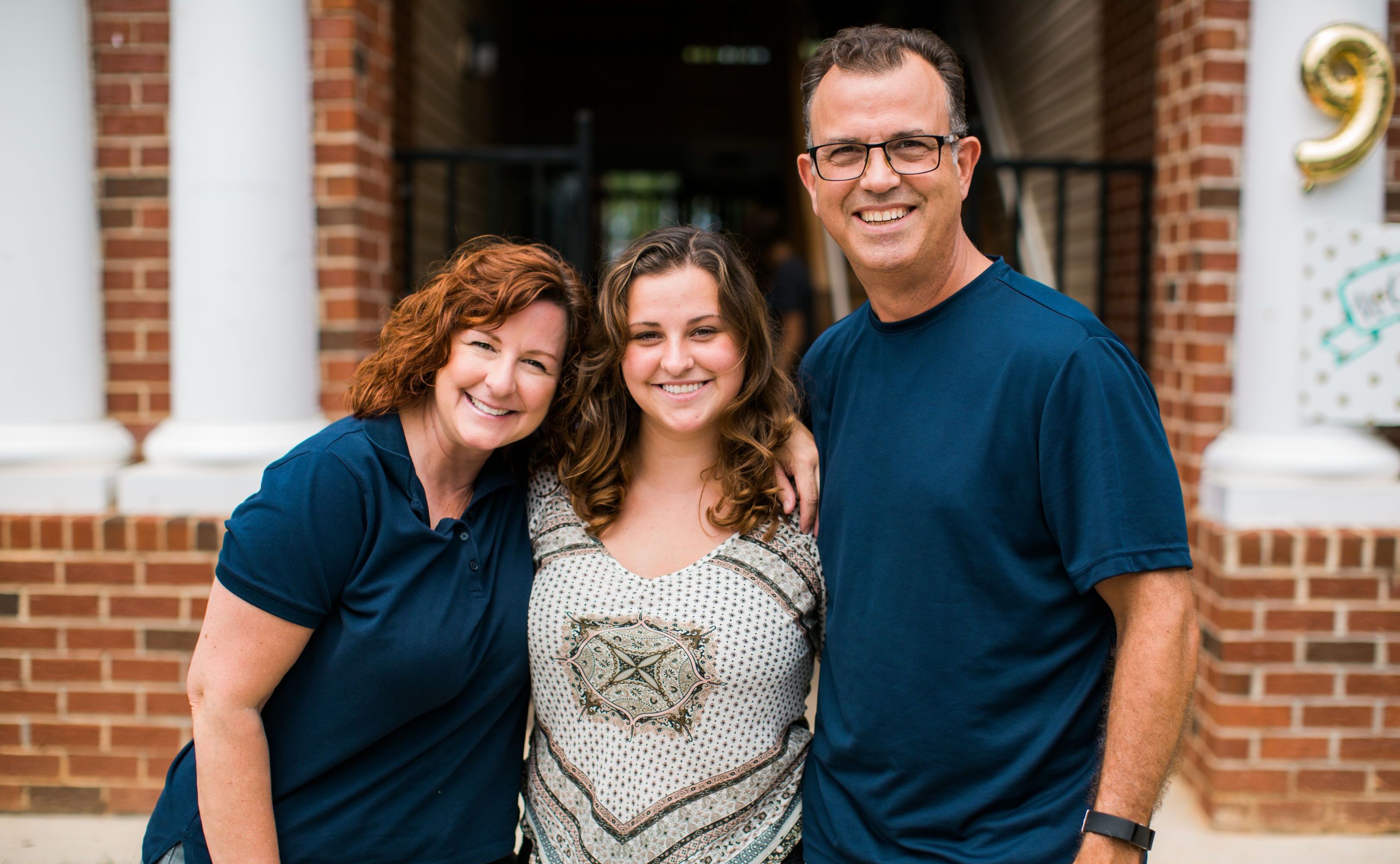
Scholarships
When it comes to choosing a college, finances make a difference. That’s why at Liberty, we believe in offering you a top-notch education — that’s also affordable. Discover how Liberty can help you keep your college costs down.
For residential students
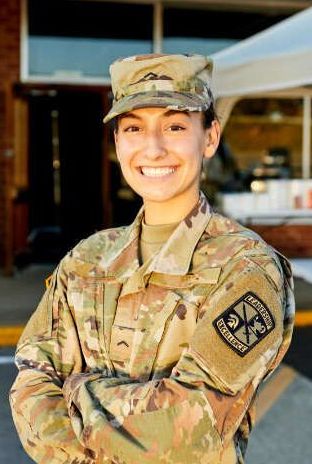
Online Discounts
At Liberty University, we believe everyone should have an equal opportunity to pursue higher education, and it's our job to keep private education affordable. Explore the many ways a Liberty education can be an affordable one.
For online students

Academic Excellence
Liberty University is institutionally accredited by the Southern Association of Colleges and Schools Commission on Colleges, and certain programs have earned additional field-specific accreditation as well.

Program for Class Day Celebration 2024
Class Day Recognizes Graduates and Awards Top Prizes in the Arts
On Monday, May 27, the Lewis Center for the Arts celebrates graduates of the Class of 2024 who earned certificates and degrees through the Programs in Creative Writing, Dance, Theater & Music Theater, and Visual Arts.
A Note from the Lewis Center for the Arts Chair Judith Hamera
Welcome to the Matthews Theatre in the McCarter Theatre Center, where we join family, friends, and members of the Lewis Center for the Arts community to celebrate the culmination of our students’ time with us. Our LCA Class of ’24 arrived amidst a global pandemic and departs amidst multiple global upheavals that, once again, challenge us all. Class of ’24, I hope your work in the LCA—your rigorous and generous collaborations, your pursuit of foundational questions around what it means to live a good and worthy life, your courage, and the care you extended to those with whom you shared this time—has given you multiple ways to see yourselves making positive differences in these complicated times, sustained by the conviction that you are part of a community of artist-scholars who can accompany you as you do so. Thank you for the work you did here, all good wishes for the important work ahead, and warm congratulations to you on behalf of the entire LCA.
Certificate Program Graduates
Creative writing.
Kenza Benazzouz, Juliette Carbonnier, Anna Chung, Arlette V. Cojab, Sydney Eck, Andi Grene, Ananya Grover, Sydney Hwang, Ashley Hyun, Sal Kang, Lara Katz, Sabrina Kim, Amanda Kural, Abbie Lambert, Kate Lee, Ellen Li, Ethan Luk, Hailey Mead, Zoe Montague, Tobias Nguyen, Anurag Pratap, Olivia Ragan, Claire Schultz, Mollika Jai Singh, Sierra Stern, Grady Trexler, Cathleen Weng, Emmett Willford, Henry Wright, Briony Zhao, Valeria Zuluaga-Sánchez
Haley Baird-Dibble, Olivia Buckhorn, Mei Cecilia Geller, Laura Maria Haubold, Ive Jumadeh Jones, Jewel Justice, Isabel Byers Kingston, Vivian Li, Zi Han Liu, Ethan Luk, Ayla-Rose Kapili’ulaokekaupoku Naehu-Ramos, Sanghyun “Chris” Park, Jasmine Minerva Rivers, Aniyah Storm Stokes, Kristen Umbriac, Julia Zhou
Theater & Music Theater
Theater Certificate Students:
Kenza Benazzouz, Juliette Carbonnier, Sandra Chen, Sarah Duntley, Nica Evans, Kerstin Fagerstrom, Kira Fitzgerald, Lana Gaige, Sydney Hwang, Sabina Jafri, Taneyah Jolly, Cooper Kofron, Charlotte Kunesh, Madeleine LeBeau, Jessica Lopez, Ethan Luk, Anaika Mehra, Tanaka Dunbar Ngwara, Raquel Ramirez, Chloe Satenberg, Aneekah Uddin, Aaron Ventresca, Bethany Villaruz, Jay White
Music Theater Certificate Students:
Casey Beidel, Juliette Carbonnier, Sarah Duntley, Sydney Hwang, Carrington Johnson, Cooper Kofron, Charlotte Kunesh, Madeleine LeBeau, Ethan Luk, Tanaka Dunbar Ngwara, Aaron Ventresca, Jay White
Visual Arts
Certificate Students:
David Akpokiere, Miriam Beams, Arianna Borromeo, Hazel Flaherty, Sreesha Ghosh, Lana Glisic, Max Jakobsen, Petr Karpov, Erin Macanze, Kirsten Pardo, Warren Quan, Collin Riggins, Luke Shannon, Julia Stahlman, Justin Zhang, Noori Zubieta
Practice of Art Students:
Daniel Drake, Evan Haley, Emma Mohrmann, Cary Moore, Ayla-Rose Kapili’ulaokekaupoku Naehu-Ramos, Lauren Olson, Magnolia Wilkinson
Student Awards
A number of seniors receive awards for outstanding achievement in each Program and top academic prizes are awarded by the Lewis Center Program Directors for overall achievement in the arts.
Top Academic Prizes
Presented by Judith Hamera, Chair of the Lewis Center for the Arts and Professor of Dance
The Louis Sudler Prize in the Arts , presented annually to one or more graduating seniors who have demonstrated excellence or the highest standard of proficiency, in performance or execution or in the field of composition in the following general areas: music, theater, dance, painting, sculpture or photography, is awarded to Tanaka Dunbar Ngwara and Ethan Luk .
The Toni Morrison Prize that honors the late Toni Morrison, Nobel Prize Laureate and Robert F. Goheen Professor in the Humanities, Emeritus, will be given to one or more graduating seniors whose individual or collaborative artistic practice has pushed the boundaries and enlarged the scope of our understanding of issues of race. This prize honors work in any form that, in the spirit of Morrison’s, is “characterized by visionary force and poetic import.” Aniyah Storm Stokes and Ayla-Rose Kapili’ulaokekaupoku Naehu-Ramos are recipients of this year’s award.
The Lewis Center for the Arts Action Based Community Engagement Award is awarded to the student or students whose contributions to the Lewis Center embody a commitment to “interrogating that which is accepted or understood in an attempt to break into the territory of the unknown or under-explored.” Jasmine Minerva Rivers and Magnolia Wilkinson are the recipients of this year’s award.
Creative Writing Prizes
Presented by Ilya Kaminksy, Professor of Creative Writing
Theodore H. Holmes ’51 and Bernice Holmes Poetry Prize — Ethan Luk Theodore Weiss Award — Tobias Nguyen Samuel Shellabarger Memorial Prize in Creative Writing — Anurag Pratap Joyce Carol Oates Award — Claire Schultz Outstanding Work by a Senior — Gloria Wang, Kenza Benazzouz, Henry Wright, Arlette V. Cojab, Madeleine Burns James Richardson Award — Ananya Grover Edmund Keeley Literary Translation Award — Ellen Li
Read a description of each creative writing award
Dance Prizes
Presented by Rebecca Lazier, Professor of the Practice and Acting Director of the Program in Dance
Francis LeMoyne Page Class of 1922 Prize for Outstanding Achievement in the Creative Arts — Zi Han Liu, Mei Cecilia Geller, Isabel Byers Kingston, Vivian Li Ze’eva Cohen Senior Award — Sanghyun “Chris” Park Outstanding Senior Independent Project — Olivia Buckhorn, Haley Baird-Dibble Sustained Community Achievement Award — Laura Maria Haubold
Read a description of each dance award
Theater & Music Theater Prizes
Presented by Jane Cox, Professor of the Practice and Director of the Program in Theater & Music Theater
Francis LeMoyne Page Class of 1922 Prize for Outstanding Achievement in the Creative Arts — Juliette Carbonnier Innovation in Theater Making Award — Taneyah Jolly, Nica Evans Outstanding Contribution to Theater — Sydney Hwang Creative and Community Leadership Award — Madeleine LeBeau Outstanding Work by a Senior in Theater (Senior Prize) — Aaron Ventresca, Anaika Mehra, Aneekah Uddin, Bethany Villaruz, Carrington Johnson, Casey Beidel, Charlotte Kunesh, Chloe Satenberg, Cooper Kofron, Ethan Luk, Jay White, Jessica Lopez, Juliette Carbonnier, Kenza Benazzouz, Kerstin Fagerstrom, Kira Fitzgerald, Lana Gaige, Madeleine LeBeau, Nica Evans, Raquel Ramirez, Sabina Jafri, Sandra Chen, Sarah Duntley, Sydney Hwang, Tanaka Dunbar Ngwara, Taneyah Jolly Outstanding Contribution to Music Theater — Aaron Ventresca, Carrington Johnson Tim Vasen Award for Talent and Citizenship — Sabina Jafri
Read a description of each theater & music theater award
Visual Arts Prizes
Presented by Jeff Whetstone, Professor and Director of the Program in Visual Arts
Jim Seawright Award in Visual Arts — Emma Mohrmann Lucas Award in Visual Arts — David Akpokiere, Miriam Beams, Arianna Borromeo, Daniel Drake, Hazel Flaherty, Sreesha Ghosh, Lana Glisic, Evan Haley, Petr Karpov, Erin Macanze, Emma Mohrmann, Cary Moore, Ayla-Rose Kapili’ulaokekaupoku Naehu-Ramos, Lauren Olson, Kirsten Pardo, Warren Quan, Luke Shannon, Julia Stahlman, Magnolia Wilkinson, Justin Zhang
Read a description of each visual arts award
Land Acknowledgement
The Lewis Center for the Arts is working to create a living land acknowledgement, one that is embodied in its consideration of—and engagement with—the past, present, and future. As we continue this work, we acknowledge that this building sits on land considered part of the ancient homelands of the Lenni-Lenape peoples and that this campus was built on this land with no recorded consultation with the Lenni-Lenape peoples. We acknowledge that learning about history and making this statement isn’t enough. Equally important is our ongoing work to understand past harms; build awareness in present relationships and actions; and bring imagination, creative problem-solving, and community-building to the future of our programs. We are taking actions towards these goals within our curriculum, pedagogy, and programming. We invite you to learn more about the Native American and Indigenous Studies Initiative at Princeton .
Lewis Center for the Arts
Chair : Judith Hamera Executive Director : Marion Friedman Young
Director of Princeton Atelier: Paul Muldoon Director of the Program in Creative Writing: Yiyun Li Acting Director of the Program in Creative Writing: A.M. Homes Acting Director of the Program in Dance: Rebecca Lazier Acting Associate Director of Dance : Susan Marshall Director of the Program in Theater & Music Theater: Jane Cox Director of Fellowships : Stacy Wolf Producing Artistic Director of Theater and Music Theater Season : Elena Araoz Director of the Program in Visual Arts : Jeff Whetstone Associate Director of Visual Arts : Pam Lins
View a list of Lewis Center for the Arts faculty
View a list of LCA staff members
The programs of the Peter B. Lewis Center for the Arts are made possible through the generous support of many alumni and other donors. View a list of LCA Supporters
Class Day Program Digital Book
Read or download the 2024 class day program (pdf), receive lewis center events & news updates.
- Santa Barbara County
- San Luis Obispo County
- Ventura County
- News Channel 3 Investigates
- U.S. / World
- What’s Right
- Local Forecast
- Interactive Radar
- SkyCam Network
- Full Election Results
- Election Coverage
- High School Sports
- College Sports
- More Sports
- Friday Football Focus
- News Channel 3-12 Livestream
- Livestream Special Coverage
- Morning News Guest Segments
- Events Calendar
- Entertainment
- Health Connections
- 805 Professionals
- Work For Us
- 805 Careers
- Advertise with Us
- Closed Captioning
- Download Our Apps
- EEO Public File Report
- FCC Public File
- How to find News Channel 12
- Public File Help
- Jobs and Internships
- Meet the Team
- Newsletters/Alerts
- TV Listings
Traveling arts organization sparks creative writing skills in students across Santa Barbara County
SANTA BARBARA COUNTY, Calif. – They are called story pirates.
“Part of a group of folks who take stories from students and live action play them out before they’re very eyes," director of education Jenna Hamilton-Rolle of the UCSB Arts & Lectures.
The actors create a fast-paced fully-improvised show.
The results are hilarious.
“The main character is a purple slug named tom and he's making paintings," student Mason Sancez of Brandon Elementary School.
Hosted by the UCSB Arts & Lectures Art Adventures Program, the focus is bringing kids into the story creation zone to create a story on the spot.
"They're in there telling their stories will the pirates reenact their imagination. so they’re having their story come to life," said parent Sara Sanchez of Brandon Elementary School.
UCSB Arts & Lectures believes Story Pirates will help kids open their minds and use their imaginations
"So excited the students are having a great time. they’ve been looking forward to the story pirates and we’ve been so blessed to have them come to our school," said Sara Sanchez.
The Story Pirates are best known for their podcast which has more than 70 million downloads.
And their hope is to remind students that they are all creative geniuses.
“Have value in the words that they use and so encouraging them to bring those that creativity in those arts to life," said Hamilton-Rolle.
“It’s super fun. it’s like … the best assembly i’ve seen," said Mason Sanchez.
The Story Pirates team hopes the students can now set sail on their own journeys to become the story-tellers of tomorrow.
Jump to comments ↓

Patricia Martellotti
Patricia Martellotti is a reporter for News Channel 3-12. To learn more about Patricia, click here .
News Channel 3-12 is committed to providing a forum for civil and constructive conversation.
Please keep your comments respectful and relevant. You can review our Community Guidelines by clicking here
If you would like to share a story idea, please submit it here .
Daily Writing Prompts NARRATIVE| Story Writing Topics | 2nd, 3rd, 4th, 5th

Also included in
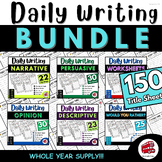
Description
Printable Daily Writing Prompts:
Get this pack of NO Prep NARRATIVE writing prompts for daily CREATIVE writing . This pack contains 22 title prompts that can be used for 2nd, 3rd , 4th and 5th Grade students . Even ESL students. More than One for each day of the week for the entire month! Just print and copy for the class. These are great journal entry titles to get your students busy and excited for writing and sharing.
This product is part of the BUNDLE:
Writing Prompts BUNDLE!! You SAVE 30%
This resource is great for:
Fast finishers
Morning Work
Gap Fillers
Topic Writing
Journal Work
You can even make a writing booklet or journal for each student from the pages in this pack. We have added lines for handwriting as well.
Visit my store for more products like this.
Kindly visit my store and Follow me for updates!
Store: Click to Follow me
Here is a FREE Word Search for you:
Free Word Search
Check out my OPINION Writing Prompts here:
30 Daily OPINION Writing Prompts for Kids
Here is Daily Writing Prompts Resource:
20 Daily Writing Prompts Resource
Check out my BACK TO SCHOOL Game:
SCATTERGORIES GAME
CUSTOMER Credit: Wanna get free TPT credit for products?
• Login and Go to My Purchases page on your profile.
• Click on Provide Feedback which you will find next to each purchase.
This will take you to a page where you can Rate and Leave a comment for that product or resource.
• TPT gives you credits whenever you give feedback. Isn't that cool?
I Appreciate your Feedback. Thank You!!
Questions & Answers
My english bus.
- We're hiring
- Help & FAQ
- Privacy policy
- Student privacy
- Terms of service
- Tell us what you think

8 Ways to Create AI-Proof Writing Prompts
C reating 100 percent AI-proof writing prompts can often be impossible but that doesn’t mean there aren’t strategies that can limit the efficacy of AI work. These techniques can also help ensure more of the writing submitted in your classroom is human-generated.
I started seeing a big uptick in AI-generated work submitted in my classes over the last year and that has continued. As a result, I’ve gotten much better at recognizing AI work , but I’ve also gotten better at creating writing prompts that are less AI-friendly.
Essentially, I like to use the public health Swiss cheese analogy when thinking about AI prevention: All these strategies on their own have holes but when you layer the cheese together, you create a barrier that’s hard to get through.
The eight strategies here may not prevent students from submitting AI work, but I find these can incentivize human writing and make sure that any work submitted via AI will not really meet the requirements of the assignment.
1. Writing AI-Proof Prompts: Put Your Prompt Into Popular AI tools such as ChatGPT, Copilot, and Bard
Putting your writing prompt into an AI tools will give you an immediate idea of how most AI tools will handle your prompt. If the various AI chatbots do a good, or at least adequate, job immediately, it might be wise to tweak the prompt.
One of my classes asks students to write about a prized possession. When you put this prompt into an AI chatbot, it frequently returns an essay about a family member's finely crafted watch. Obviously, I now watch out for any essays about watches.
2. Forbid Cliché Use
Probably the quickest and easiest way to cut back on some AI use is to come down hard on cliché use in writing assignments. AI tools are essentially cliché machines, so banning these can prevent a lot of AI use.
Equally as important, this practice will help your students become better writers. As any good writer knows, clichés should be avoided like the plague.
3. Incorporate Recent Events
The free version of ChatGPT only has access to events up to 2022. While there are plugins to allow it to search the internet and other internet-capable AI tools, some students won’t get further than ChatGPT.
More importantly, in my experience, all AI tools struggle to incorporate recent events as effectively as historic ones. So connecting class material and assignments to events such as a recent State of Union speech or the Academy Awards will make any AI writing use less effective.
4. Require Quotes
AI tools can incorporate direct quotations but most are not very good at doing so. The quotes used tend to be very short and not as well-placed within essays.
Asking an AI tool for recent quotes also can be particularly problematic for today’s robot writers. For instance, I asked Microsoft's Copilot to summarize the recent Academy Awards using quotes, and specifically asked it to quote from Oppenheimer's director Christopher Nolan’s acceptance speech. It quoted something Nolan had previously said instead. Copilot also quoted from Wes Anderson’s acceptance speech, an obvious error since Anderson wasn’t at the awards .
5. Make Assignments Personal
Having students reflect on material in their own lives can be a good way to prevent AI writing. In-person teachers can get to know their students well enough to know when these types of personal details are fabricated.
I teach online but still find it easier to tell when a more personalized prompt was written by AI. For example, one student submitted a paper about how much she loved skateboarding that was so non-specific it screamed AI written. Another submitted a post about a pair of sneakers that was also clearly written by a "sole-less" AI (I could tell because of the clichés and other reasons).
6. Make Primary or Scholarly Sources Mandatory
Requiring sources that are not easily accessible on the internet can stop AI writing in its tracks. I like to have students find historic newspapers for certain assignments. The AI tools I am familiar with can’t incorporate these.
For instance, I asked Copilot to compare coverage of the first Academy Awards in the media to the most recent awards show and to include quotes from historic newspaper coverage. The comparison was not well done and there were no quotes from historical newspaper coverage.
AI tools also struggle to incorporate journal articles. Encouraging your students to include these types of sources ensures the work they produce is deeper than something that can be revealed by a quick Google search, which not only makes it harder for AI to write but also can raise the overall quality.
7. Require Interviews, Field Trips, Etc.
Building on primary and scholarly sources, you can have your students conduct interviews or go on field trips to historic sites, museums, etc.
AI is still, thankfully, incapable of engaging in these types of behavior. This requires too much work for every assignment but it is the most effective way to truly ensure your work is human- not computer-written.
If you’re still worried about AI use, you can even go a step further by asking your students to include photos of them with their interview subjects or from the field trips. Yes, AI art generators are getting better as well, but remember the Swiss cheese analogy? Every layer of prevention can help.
8. Have Students Write During Class
As I said to start, none of the methods discussed are foolproof. Many ways around these safeguards already exist and there will be more ways to bypass these in the future. So if you’re really, really worried about AI use you may want to choose what I call the “nuclear option.” If you teach in person you can require students to write essays in person.
This approach definitely works for preventing AI and is okay for short pieces, but for longer pieces, it has a lot of downsides. I would have trouble writing a long piece in this setting and imagine many students will as well. Additionally, this requirement could create an accusatory class atmosphere that is more focused on preventing AI use than actually teaching. It’s also not practical for online teaching.
That all being said, given how common AI writing has become in education, I understand why some teachers will turn to this method. Hopefully, suggestions 1-7 will work but if AI-generated papers are still out of hand in your classroom, this is a blunt-force method that can work temporarily.
Good luck and may your assignments be free of AI writing!
- 7 Ways To Detect AI Writing Without Technology
- Best Free AI Detection Sites
- My Student Was Submitting AI Papers. Here's What I Did


IMAGES
VIDEO
COMMENTS
Other Creative Writing Prompts for 3rd-Grade Students. Write a scene where a famous person from another time period shows up in your classroom. Write a diary entry from the perspective of a Disney character or a character from a book you've read. Think about a scene you didn't love in your favorite movie.
In these 30 writing topics for grade 3 students, your class will get to explore wild hypotheticals such as what three wishes they would request from a magic genie and what new ways of life people might experience in the future. They'll also practice self-reflection as they think about big topics like what it means to be a good friend and the ...
10. Tell about a time you helped somebody. 11. Tell about a time somebody helped you. 12. Tell about a memorable "first" in your life. For example, the first time you ate a particular kind of food, the first time you met your teacher, etc. 13. Describe step by step how to make a pizza.
In summary, here are 10 of our most popular creative writing courses. Creative Writing: Wesleyan University. Write Your First Novel: Michigan State University. The Art of Storytelling: IESE Business School. Introduction to Psychology: Yale University. The Strategy of Content Marketing: University of California, Davis.
I hope you enjoyed this list of creative writing topics for Grade 3. These ideas are good for elementary school writing class, journal keeping, or inspiring a short story. The "Favorite Things" List of Prompts for 3rd Graders. For those reluctant writers or non-writers, we suggest you use the time-tested favorite writing prompts.
15 hours. Best University-level Creative Writing Course (Wesleyan University) 5-6 hours. Best Course to Find Your Voice (Neil Gaiman) 4-5 hours. Best Practical Writing Course With Support (Trace Crawford) 12 hours. Best Course to Overcome Writer's Block: 10-Day Journaling Challenge (Emily Gould) 1-2 hours.
MasterClass Categories. Acting & Performing Arts Business & Entrepreneurship Community & Government Food & Drink Art & Design Games & Digital Media Film & TV Health & Wellness Music Outdoor Adventures & Events Science & Technology Sports & Athletics Writing.
Teaches Creative Writing. Learn how the author of The Handmaid's Tale crafts vivid prose and hooks readers with her timeless approach to storytelling. Starting at $10/month (billed annually) for all classes and sessions. Trailer. Sample. Share. Explore the art of creative writing with acclaimed novelist Margaret Atwood, author of The Handmaid ...
In this fun and energetic summer course, students build critical reading and writing skills as they create their very own picture books. Live instructors guide students (ages 8-11) through lessons in reading, analyzing, and creating a range of original pieces. Creative Writing. Grade. 3-4. Term.
Third Grade Creative Writing Worksheets. Encourage your third-grade students to show their creative sides, with our most popular creative writing printables. They'll be inspired by these poetry and story-writing activities and lessons. We have holiday-themed worksheets, daily writing prompts, rubrics for grading work, literature guide extension ...
Learn Creative Writing, earn certificates with paid and free online courses from University of Michigan, Johns Hopkins, UC Irvine, UC Berkeley and other top universities around the world. Read reviews to decide if a class is right for you.
The Creative Writing specialization consists of five courses that focus on three genres: short story, narrative essay, and memoir. Within those genres, you'll learn about crafting characters and settings, writing descriptions, and developing your style, followed by a capstone class that will result in a completed story, essay or memoir.
Creative writing for Class 3 should be structured in a way that is easy for young children to understand and follow. The basic format should include: 1. Introduction: The introduction should provide a brief overview of the topic and set the scene for the story. 2. Body: The body of the story should include the main events or ideas.
Online Creative Writing Classes. Find what fascinates you as you explore these online classes. Start for Free. Skillshare is a learning community for creators. Anyone can take an online class, watch video lessons, create projects, and even teach a class themselves.
Learn creative writing with online courses delivered through edX to advance your career today.
Specialization - 5 course series. This Specialization covers elements of three major creative writing genres: short story, narrative essay, and memoir. You will master the techniques that good writers use to compose a bracing story, populated with memorable characters in an interesting setting, written in a fresh descriptive style.
7. The Best Online Creative Writing Courses Foster a Writing Community. A creative writing course fosters a creative writing community. This community gives you the motivation to create, as it creates a safe environment to experiment, take risks, and grow in your writing practice.
In summary, here are 10 of our most popular creative writing courses. Creative Writing: Wesleyan University. Write Your First Novel: Michigan State University. The Art of Storytelling: IESE Business School. Introduction to Psychology: Yale University. Academic English: Writing: University of California, Irvine.
Start with an introduction to creative writing including why we write, the reasons to write, and how to find ideas for your stories. The first part of this course lays the groundwork for being a good writer. This includes: Learn why we write, and the key elements of great writing. Learn grammar, an essential aspect of good creative writing.
5. Read, read, read. It's a lot harder to get the hang of creative writing if you don't have any references from which to draw. Notable writers throughout history have penned excellent examples of well-written creative work that should be required reading for any budding creative writer.
Online Courses. Stanford Continuing Studies' online creative writing courses make it easy to take courses taught by instructors from Stanford's writing community. Thanks to the flexibility of the online format, these courses can be taken anywhere, anytime—a plus for students who lead busy lives or for whom regular travel to the Stanford ...
Associate of Arts in Creative Writing. Liberty's 100% online Associate of Arts (A.A.) in Creative Writing offers you the opportunity to enhance your writing skills as you prepare for a future ...
As a creative writing student at Austin College, you will learn how to craft effective stories and poems, build new worlds, and connect to your audience in powerful ways. You will enjoy small workshop classes, hands-on feedback from expert instructors, and opportunities to explore the landscape of publishing. Come and join our vibrant community ...
Class Day Recognizes Graduates and Awards Top Prizes in the Arts. On Monday, May 27, the Lewis Center for the Arts celebrates graduates of the Class of 2024 who earned certificates and degrees through the Programs in Creative Writing, Dance, Theater & Music Theater, and Visual Arts.
Traveling arts organization sparks creative writing skills in students across Santa Barbara County. ... News Channel 3-12 is committed to providing a forum for civil and constructive conversation.
Printable Daily Writing Prompts: Get this pack of NO Prep NARRATIVE writing prompts for daily CREATIVE writing.This pack contains 22 title prompts that can be used for 2nd, 3rd , 4th and 5th Grade students.Even ESL students.More than One for each day of the week for the entire month!Just print and copy for the class. These are great journal entry titles to get your students busy and excited ...
t. e. The academic discipline of women's writing is a discrete area of literary studies which is based on the notion that the experience of women, historically, has been shaped by their sex, and so women writers by definition are a group worthy of separate study: "Their texts emerge from and intervene in conditions usually very different from ...
2. Forbid Cliché Use. Probably the quickest and easiest way to cut back on some AI use is to come down hard on cliché use in writing assignments. AI tools are essentially cliché machines, so ...
3. Swin or Sink. Collect different objects from around the house like sponges, marbles, etc. Now, using a small tub, fill it with water. One by one, put the objects in the water and make a chart of whether they swim in the water or sink in it. 4. Mini Museum. For this activity, go for a walk in nature.
The history of writing traces the development of writing systems and how their use transformed and was transformed by different societies. The use of writing prefigures various social and psychological consequences associated with literacy and literary culture.. With each historical invention of writing, true writing systems were preceded by systems of ideographic and mnemonic symbols called ...